#since the games tackle a lot of contemporary issues!
Text
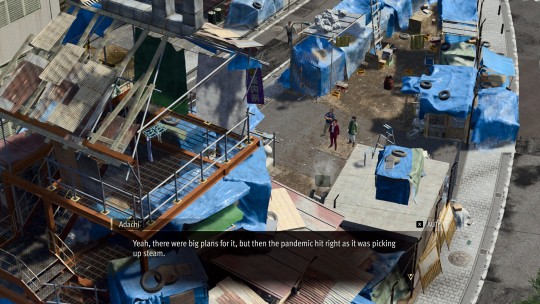
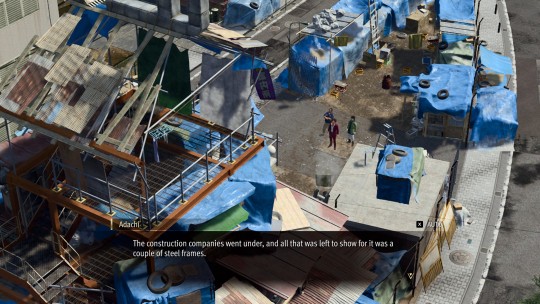
it's almost wild to think that the covid-19 pandemic is canon in the yakuza/lad universe.
#then again it's not#since the games tackle a lot of contemporary issues!#yakuza#lad#like a dragon#lad infinite wealth#adachi koichi#koichi adachi#mads plays games#mads plays yakuza#mads plays lad iw#ladiw spoilers#yokohama#nanba yu#kasuga ichiban#ichiban kasuga#yu nanba#mads takes screenshots
21 notes
·
View notes
Text
Okay so as much as I dislike conflating Pokémon and Digimon, (they’re two shows that just so happen to be in the same genre and I think the comparisons should stop there. The bad faith ones anyway), how great the new Pokémon anime is has made me think about something.
Basically, I feel like Horizons has a lot of elements that I would love to see in a modern season of Digimon and I think the Digimon anime could take a page from their playbook. Which is funny since up until now I’ve always said the reverse.
Full rant bellow the cut to spare your time lines if you don’t want to read my rambles.
I split them into section going into Digimon first and then Pokémon if you want to skip around and don’t care about the other franchise. BUT, I will say that the point of this essay is that Pokémon Horizons is good, the first three seasons of Digimon are good and if you like one you should watch the other.
Anyway.
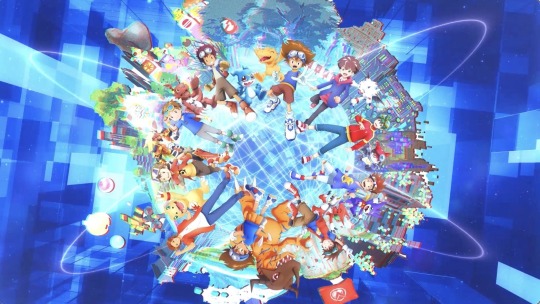
First I’m going to go into my history with Digimon and what I liked about the classic seasons and what I don’t like so much about the newer ones.
Basically, I love Digimon. Been hyper fixating on it off and on for twenty+ years. I’ve seen every season, subbed and dubbed multiple times, I’ve played a good chunk of the games, I play the TCG, ect.
Something that drew me to the Digimon anime over AniPoke, was the characters and the plot. In the early seasons Digimon tackled lots of difficult issues like divorce, adoption, death, loss, depression, among other things. But still kept a light hearted, feel good air. The characters felt deep and multi-faceted (At least in the sub), and I dare say are better written than some characters from some adult oriented anime out there. And they had cute monsters that evolved into bigger monsters and fought baddie monsters, what wasn’t there to love? The first three or so seasons did a fantastic job juggling characters, plot, cool creature fights, and cute and funny moments between the members of the cast. It never really felt like a commercial compared to contemporaries. It felt like the writers were creating something with soul, it was a story first and ad second. It felt like it had love.
Adventure, 02, and Tamers are my favorites. Bellow are some characters and their arcs I really enjoyed from those seasons, skip if don’t want spoilers.
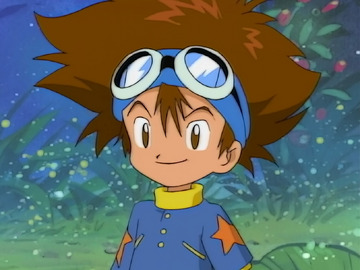
I love Taichi’s arc of being reckless, and being one track minded to the point where he put all his friends in harms way and Yamato tries to act like this calm and cool lancer type but he’s actually the group heart and sensitive the way they bounce off each other and have conflicts throughout the series is just fantastic.
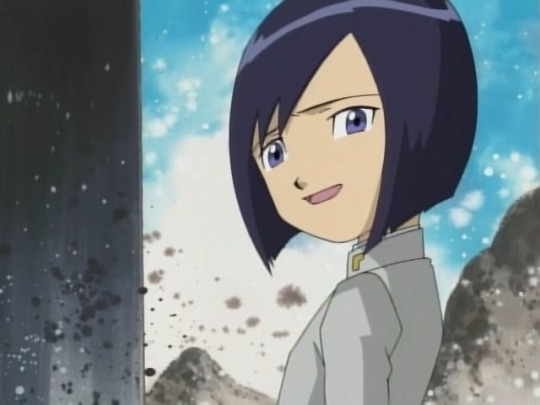
Ken in 02 and his whole arc of getting over the death of his brother and accepting the consequences of his actions as the Digimon Kaiser. And the way he slowly warms up to the group is so cute. I legit cried when I watched some of his episodes post kaiser as an adult.
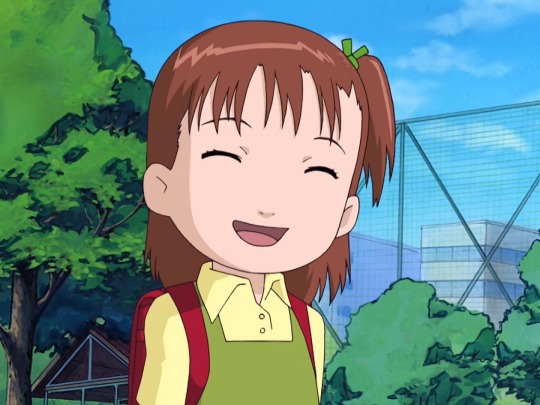
Tamers as a whole is an extensional horror trip. Juri’s whole thing with her depression after the death of Leomon, how it related back to her trauma after losing her mom when she was younger, and the way the D-Reaper took advantage of that- I honestly don’t know how this was slipped into a kids show from the early 2000s.
A lot of these shows that started in the 90s and early 2000s were pledged with the “Glorified 20-25 minute toy ad” problem, and Digimon didn’t really seem to have that issue to me. It felt like the creators were putting the story and characters first, and an ad second or third.
The early seasons of Digimon felt like a celebration of childhood and was something that could be enjoyable to kids of all ages and adults alike. I don’t at all get that feeling that I’m watching a baby show when I watch early Digimon. It presents things in simple terms that kids could understand without talking down to its audience. It’s great.
And then the later seasons happened and Digimon forgot what made it great and lost its soul…
Xros wars was where the ball really seemed to drop in my opinion. Sure it still had the epic Kaiju fights but… that’s about it. Gone were the intense character moments and interesting plots. All we had was the special little marry sue of a boy Taiki who could do nothing wrong besides not “TURNING HIS BACK ON SOMEONE uwu”. And there was no overcoming adversity like in the earlier seasons, Taiki would just epically throw his Xros loader into the air and scream away his problems with a “DIGi-XROS!” (Sorry Taiki fans I can’t conceal my venom for this man)
And the monsters were just disappointing too. Like they were clunky and just looked like… toys.
It felt like Digimon had lost what made it tick and started to more closely resemble what I didn’t like about AniPoke, a toy commercial with a sanitized feel.
This continued for the next couple of seasons, only really picking up again in Appmon, but while Appmon is good and had it’s moments (I love the story with Yujin. He and Haru are totally roommates, cousins even), it still doesn’t compare to the heart the first three to five seasons had, imo.
Tri felt like a soulless nostalgia cash grab. Last Kizuna was good, it gave me hope for the anime again just to crush it all away with The Beginning.
I won’t get started on Adventure 2020 or we’ll be here all day. Needless to say it spat in the face of the show it was paying homage to.
Ghost Game got my hopes up, but then the last episode just took a dump on the rest of the show. It was fun, Kiyoshiro and Jellymon specifically were the stars of the show and GulusGammamon was interesting… until he wasn’t. It was fun, had a lot of potential with its horror feel, and was the closest to classic Digimon the modern seasons had been in awhile… at first anyway. It really shat the bed. And my problem with it don’t really relate to it being episodic in nature or anything, that can be done well. The characters just didn’t feel consistent (Especially Ruli) and it didn’t deliver on any of the plot intrigue it tried to stir up.
BUT! Ghost Game at least had… a little bit of heart. It felt like the creators knew their Digimon lore and did a fantastic job incorporating it into the monster of the week. I could really feel the love there.
Also on a side note, I am not just the Digimon equivalent to Gen-Oner, hating on things that are new and fetishizing the old. In fact, before I rewatched all of the seasons around 2020, I didn’t really care for the Adventure or Tamers. But my opinions did a total flip watching everything as an adult.
So, for a quick collection of thoughts before we move on to Pokémon:
What I like in a Digimon season:
1. Good characters with arcs that tackle bigger issues in a way kids can still understand and relate to without feel like they’re being talked down to.
2. Cute moments between members of the cast and their creatures.
3. Fights that feel like they mean something and aren’t just there for cool flashy effects.
4. A feeling of love and care for the franchise that goes beyond just trying to sell me toys and games.
Things I don’t like:
-OP mcs that solve every problem with the gimmick of the given seasons
-Flat, inconsistent characters that don’t feel like they have any agency or reason for doing what they’re doing besides that fact that they do indeed have Digimon.
-Pointless fights that are just there for no other reason than just to show a cool fight
-“BUY ALL OUR GAMES AND TOYS AT YOUR LOCAL HOBBY SHOP”
Okay now Pokémon.
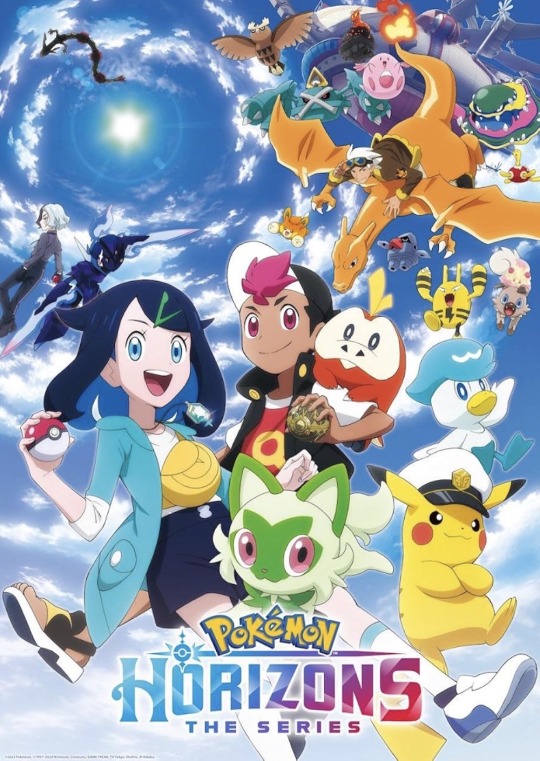
Just like with Digimon here’s a little background with my history with the Pokémon anime
I’ve watched the original Pokémon anime up to Diamond and Pearl as a kid and I watched some of SM and most of Journey’s as an adult, but I’ve never really been big on anipoke.
Like at best it just felt like a cute show I could turn my brain off for and just vibe.
At worst it felt like a hyper sanitized toy/game commercial (Not blaming it, that was the anime’s main purpose after all).
Out of curiosity, I watched the new series. As much as I liked Ash, I really felt like he overstayed his welcome and they should have gotten rid of him and moved on ages ago since it felt like by DP there was nothing interesting to do with the character. The Pokémon world is huge and intresting, there was so much they could have done but Ash kind of felt like he bogged it down and stunted the anime’s growth past a point.
So yeah,I got excited when they finally pulled the plug and focused on a new set of characters so I gave Horizons a watch.
And I love it! It’s got heart, characters with development, a little bit of plot, and it’s cute? Like I was dumbfounded by the fact that a Pokemon anime, that I previously wrote off as just being a glorified ad, could be so good???
And then after thinking about what I liked so much about it, that’s when the topic of this essay hit me: Horizons feels like it has everything I long for in a modern Digimon anime, almost as if they took a page out of classic Digimon’s book. Like I always heard throughout the years that “Digimon had the better anime Pokemon has the better games” But Horizons really turned that on its head.
Let’s revisit my criteria for what I liked about the classic Digimon seasons from the section above to show what I mean. (Light Spoilers for Horizons ahead, though I wont go into specifics)
1. Good characters with arcs that tackle bigger issues in a way kids can still understand and relate to without feel like they’re being talked down to.
Yep. Horizons has that. Like the early seasons of Digimon, Horizons doesn’t just use it’s human characters as a vehicle to show you all the monsters you could catch if you bought the next game from your local shop for the low low price of 60 USD, nope. There feels like theres care there.
While they aren’t fully developed yet, Liko and Dot especially show huge character growth in the first 50 episodes. They focus on their flaws and how the characters overcome them.
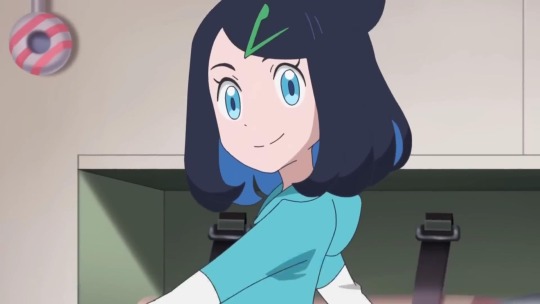
Liko is very indecisive at first. She’s socially awkward, she feels like shes just going with the flow, afraid to take that first step to find out what she really wants out of life. Then, she finally does, she makes the decision to follow Friede and the Rising Volttacklers to find her new horizons. It’s great. And she still has lots of growing she can do later both as a trainer and as a character. She’s fantastic for a lead.
I also like how they use Sprigatito’s evolution as stand in for Liko’s growth so far in the series. Early Digimon did that too with the Crests in Adventure and the Bio Merging in Tamers and I always really like monster partners evolving to reflect their human so much, it’s such a good narrative device!
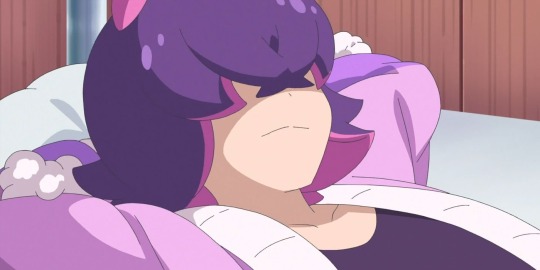
Dot slowly being brought out of her shell by Liko and the others is just- chefs kiss. She goes from being a reclusive shut in to slowly taking interest in the things Liko and co are doing and develops meaningful relationships with them. Her care for her friends and want to be there for them makes her take the first step and is now traveling around Paldea with them! And they went about this in a very well paced way where she still isn’t just magically over all her awkwardness and shut in tendencies yet. She too still has so much room for interesting development later down the road.
The adult characters are interesting too, even though they haven’t really done much yet. They really perfected that found family group of misfits trope that I’m usually pretty sick of. I love them.
And Amethio and the other villains also feel like they’re more than just your cackling evil for evil sake type characters and I’m super excited to see what they do with them!
And as far as the tackling bigger issues point: Though its just conjecture and I might be over thinking things (Though others in the fandom have pointed this out too) there’s definitely the groundwork for it here.
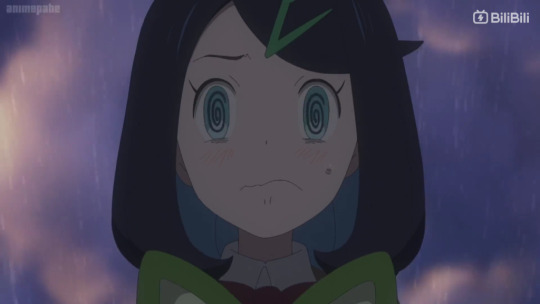
Liko’s family is very hands off and distant. Liko goes away to boarding school at the start of the series, her parents work, and her grandma is a vagabond traveling the world and doesn’t often stay in one place for long.
Liko lacks solid connections and foundation in her life due to her family being so closed off emotionally, which would explains her going with the flow and being unsure of what she really wants to do. She’s lost with no guidance. And it’s not like her family doesn’t love each other, no. They just don’t want to express their feelings for fear of it bogging each other down. They want Liko to be free to do what her heart tells her, but they’re so worried about talking things out that they don’t realize how that freedom has hurt Liko and made her into an anxious mess. (They even kind of hint at this in the second opening)
But yeah, like others have said, I’m not sure if this is on purpose or if they were trying to write Liko’s family to be full of strong women and just kind of accidentally fell into making them all feel too independent and distant from one another. And it would be really cool for the show to go into Liko’s home life more… but I’m not sure it would be on brand for Pokemon to talk about something so heavy. But fingers crossed!
2. Cute moments between members of the cast and their creatures.
Yep! Horizons has got plenty of it. Right now all of the main cast has two Pokemon each and they’re really taking the time to show off each Pokemon and give them a lot of wholesome moments together and with their trainers.
The human character interactions are great too! I really like the blossoming friendship between Liko and Dot (They could be roommates guys!) and the growing rivalry between Friede and Amethio! It’s great!
3. Fights that feel like they mean something and aren’t just there for cool flashy effects.
The fights in Horizons are so cool and well choreographed, but they aren’t just there to look pretty, not at all!
A lot of the fights that take place in the first two arcs are learning experiences for Liko, Roy, and Dot. They learn new strategies, their Pokemon learn new moves, and in the arc that’s airing at the time of writing, they’re learning how to terrestialize too. The fights don’t seem to happen without purpose and always seem like they either teach the characters a lesson about proper ways to be a trainer and even sometimes help them grow as characters too.
And theres even a healthy amount of losses and wins under the character’s belts and they drive home the lesson of “You learn more from a defeat”. I like how heavily they relied on the more experienced Friede at the beginning and they got frustrated from their losses and used it as fuel to want to learn to stand on their own two feet.
The fights are great and don’t just feel like a kid mashing two toys together like some series with battle elements can.
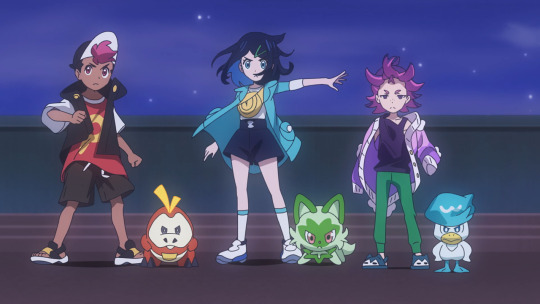
4. A feeling of love and care for the franchise that goes beyond just trying to sell me toys and games.
This is a little harder to explain and is more like a feel than anything. But I can definitely feel an air of care in Horizons that I don’t really see from shows that feel like twenty-three minute ads. The characters and story don’t just feel like they’re trying to sell me something.
While they’re definitely leaning heavy on the Paldea setting right now, it doesn’t feel like a straight adaption of the games. They don’t really do the “creature of the day” or “character of the day” type episodes like I remember seeing in past iterations of Anipoke. Horizons doesn’t have those moments that I feel like the character is looking right at me and saying “Buy Buy Buy”
And, at least so far, there seems to be a love for Pokemon with the way the reference Pokédex entries like with Hatenna being sensitive to strong emotions or what not.
Like I said, this is really more of a personal criteria and some people can be more sensitive to this kind of thing than others. The closest thing I can compare it to is like when you’re eating a meal a loved one made for you versus something you got at a diner or fast food restaurant. You don’t know how to put your finger on it but you can just taste the love… it’s like that with Horizons to me.
So yeah!
If you’ve read this far, thanks for listening to me rant! I’ll try to wrap it up here.
Basically I just really like Horizons. It gives me that same feel as when I was rewatching the classic Digimon seasons a view years ago… And like the way Horizons fixed all of the problems I had with Anipoke as a kid and as an adult is awesome, it really feels like Pokemon Company is making an effort to listen to criticism and better the series… I just really hope the Digimon anime can do the same.
Oh and all of this is just my opinion, if I said something that you don’t agree with about Digimon or Pokémon, I meant no offense and I’m happy to hear your opinions too!
I just want to close this by saying…
Fans of early Digimon, go watch Pokemon Horizons! You wont regret it!
Fans of Horizons go watch (the sub) of the first three or so seasons of Digimon! If you like Horizons and didn’t really click with Ash era Anipoke I think you’ll really have a good time, it’s so good!
I think both series could use more love, so go out there and give them both a watch!
Okay I’ll shut up now, thanks for reading!
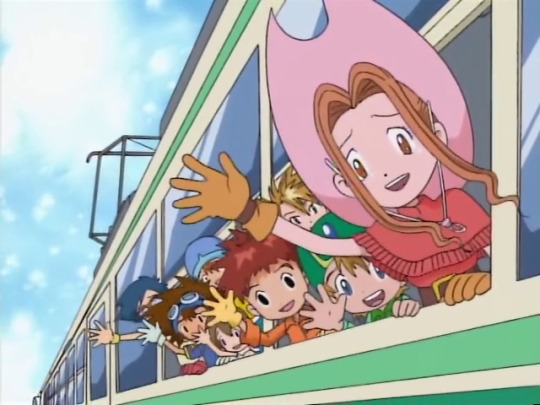
#dumb rant#I think too hard about kids anime from the 90s#i just have a lot of feelings#pokemon#pokemon horizons#anipoke#digimon#digimon adventure#digimon adventure 02#digimon tamers#digimon anime#digimon xros wars#digimon universe appli monsters#digimon ghost game#digimon tri#digimon last evolution#digimon the beginning#media analysis#text post
26 notes
·
View notes
Text
Game 225 - Pokemon Violet by Game Freak
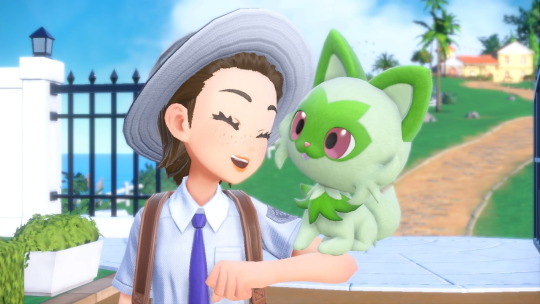
What did I think it was at first? I’m a Pokemon diehard - started with Red, been playing since I was five and so in. Before I started Violet, I avoided spoilers as much as possible, but it was difficult to avoid a lot of the technical criticism of this game. Still, I’m not going to miss a pokemon game - so let’s take a look at this. I’ve played through the end but I haven’t tackled the postgame content yet.

How was the character creator? This is the most diverse a Pokemon creator has been! Gone are the days of choosing whether you are a boy or a girl. You can pick from a pretty diverse set of portraits, though you do still have to be addressed with feminine or masculine pronouns. The hairstyles are cool, but they’ve really scaled down the outfit customization which is a bit of a bummer.

How was the game? Overall, story wise I was really happy with the game! This is definitely a fun remix of the traditional Pokemon formula. Unlike most of the mainline games which set you on the path to becoming champion, in Violet you are free to explore and find your “treasure”, whatever that may be.
Overworld exploration is really a wonderful part of the game - I found that many of my sessions were just devoted to filling out my Pokédex and hunting down monsters I hadn’t caught yet. I really love a school game like Persona and this is basically that but you climb mountains and track down Pokemon. The world has pretty and diverse environments and the Pokemon they’ve selected for inclusion this time are pretty cool.
To reach the end of the game, you have to complete 3 storylines. The Titan story is really heartwarming and sweet, and it really sets up your emotional investment in the world. I thought the Gym challenge was well done, too - the game really makes Nemona lovable and the Gym Leader characters feel like part of the world. I thought Team Star was kind of boring - a storyline based around catching Pokemon would have been cooler in my opinion. Since the DS titles, the bad guy organizations have been kinda boring.
What did I not love? The technical issues were really tough to overlook. The open world is cool but pop-in is a serious issue, along with clipping through the ground and environment. After long sessions, there’s significant laggy bits - and your frame rate slows in cutscenes and when near water. I don’t recall any of these issues in Legends: Arceus (though I haven’t finished it yet) and it makes the game feel really unfinished.
Most of the music is really good, but you spend a lot of time in the academy itself taking classes and building your relationships with teachers, which is unfortunate because of the one really short musical track that plays there. It is engraved on my skull forever and ever. I can hear it as I type this. I will hear it in my dreams.
The classes could have been shortened as well. I was having such fun out in the world that I ended up cramming them all at once which was not a fun experience.

The dialogue also is more contemporary than other Pokemon games, which I guess is an attempt to embrace the school environment- but I worry it won’t help the game age well. Part of what I love about the original GB titles is that they are timeless. Also, it’s long past time that Pokemon games should be voiced.
At 46 hours and $60, was it really worth it? I wouldn’t recommend Scarlet and Violet as an entry into the series - Sword and Shield are better for that, or Let’s Go, Pikachu. However, if you like Pokemon and you can overlook the glaring flaws, there’s a lot of fun to be had here.
3 notes
·
View notes
Text
Anticipating the Future: What to Expect in GTA 6

GTA 6
The gaming world is buzzing with excitement as Rockstar Games gears up for the highly anticipated release of Grand Theft Auto VI, or GTA 6. While the developers have been tight-lipped about the specifics, there have been numerous leaks, rumors, and educated guesses about what players can expect in this next installment of the iconic open-world game series.
First and foremost, fans can anticipate a new location. Each GTA game has introduced players to a fresh and expansive environment, and GTA 6 is no exception. Rumors suggest that it will be set in Vice City, a fictional take on Miami. This change of scenery promises new opportunities for exploration, crime, and mayhem. The shift to a more tropical setting could also influence gameplay mechanics, such as the introduction of water-based activities like boating and swimming.
Rockstar Games is known for its immersive storytelling, and GTA 6 is expected to continue this tradition. The game is likely to feature a compelling narrative with complex characters and morally ambiguous choices. Some rumors even suggest that players might take on the role of multiple protagonists, similar to GTA V, providing different perspectives on the story.
One of the most exciting aspects of any GTA game is the vehicles, and GTA 6 is expected to deliver a diverse range of cars, motorcycles, planes, and boats. The game's setting in a sprawling metropolis should provide ample opportunities for thrilling chases and epic stunts. Additionally, Rockstar is likely to introduce a host of new weapons and gadgets, allowing players to wreak havoc in creative ways.
In terms of graphics and realism, GTA 6 is poised to push the boundaries of what's possible in open-world gaming. With the power of next-gen consoles and high-end PCs, players can look forward to breathtaking visuals, enhanced physics, and a level of detail that makes the in-game world feel more alive than ever.
Rockstar has always been known for its attention to detail, and this extends to the game's radio stations. Music is an integral part of the GTA experience, and fans can expect a diverse soundtrack spanning various genres and eras. The radio hosts and commercials, which have become iconic in the series, are likely to be just as memorable in GTA 6.
Multiplayer has been a significant part of the GTA series since the introduction of GTA Online in GTA V. GTA 6 is expected to take online play to new heights, with even more immersive and expansive multiplayer modes. Whether it's cooperative heists, competitive races, or simply causing chaos in a shared world, the multiplayer component of GTA 6 is sure to be a major draw.
While GTA 6 promises a lot of new and exciting features, it's also essential to remember that the game will likely continue the series' tradition of social commentary and satire. Expect to see the game tackle contemporary issues and poke fun at various aspects of modern society, all in the irreverent and often controversial style that GTA is known for.
Grand Theft Auto VI is shaping up to be a game-changer in the world of open-world gaming. With a new location, engaging storytelling, an array of vehicles and weapons, stunning graphics, an eclectic soundtrack, expanded multiplayer, and the series' signature satire, GTA 6 is poised to set a new standard for the franchise. While the official release date is still a mystery, the anticipation continues to build, and fans around the world are eagerly awaiting the moment they can dive into the criminal underworld of GTA 6.
Read the full article
0 notes
Text
The Lack of Diversity in US publishing (yes, intersectional post)
I get that some publishing pros might think this will fall into a hate piece, but it's not. It's looking at systemic, not individualistic problems and asking that everyone pick up the slack.
Someone's going to try to chase me on the idea that I don't know how publishing works and never worked for a publishing company, even if both are patently not true. But whatever. You want a biography of my life, pay me. I'm not going to info dump all my life experiences into my bio page.
Anyway, as usual, I majored in Anthropology, concentrated in systems and if somehow people haven't been paying attention to all of the material I've produced over the years–yes I know world lit fairly well (I'm not saying top mastery because there is no such thing with world lit). I *also* happen to collect and know how publishing systems in other countries work and their rough histories and stats, so I know that this is mostly a US problem and I'm calling it out because !@#$, really? You want to call yourself the best when other countries are kicking your butt?
I have the history of publishing in my head. All the way from the Invention of paper, the objections of Plato to writing to the common era. So no, not that ignorant, and yes, I think I could beat some publishing pros that say they know publishing well on errata knowledge of publishing history given what they post on Twitter sometimes. Which isn't boasting per se, but more, I think publishing pros *should* know more than me, like international publishing practices and story structures so they are ahead of the game and can sell, say a client's book to the *correct* international publisher with the correct proposal, but that might just be me. (Especially since time and again, it's said international gets more royalties than domestic).
That said, I'm *not* going to run down the history of publishing, etc. I'm just establishing I'm not ignorant in case people want to challenge, and if they challenge they can do so with more academic papers/articles, etc, rather than starting from the bottom.
What we know is that the demographics of the publishing industry have drastically changed since the 1980's with Pew Research Center pretty much publishing their findings since then about race, etc. But the publishing industry has failed to meet the demand with supply. I want to examine the hurdles of diversity faces in order to overcome these barriers and why, even after the call for diversity, the numbers have not changed, even when clearly the demographics of readership has.
This is mostly theory backed with academia. And no, it's not a 101 on diversity, DEI and publishing–it's going to assume you know all this coming in, but not use snobby academia words to get there.
If there is one thing that South Korea faced when it decided to push the dramas on the rest of the world is that the Google App and Apple Store rule is true–people like celebration of diversity and most of all in this global economy–kindness—this is the flip that was experienced in Story structure, as well (Which I've well covered with things like reality TV shows where commenters LOVE seeing cooperation, not just chaos and competition.)
So, Korean published a lot of the issues facing it honestly when creating dramas, which is a long-standing tradition stretching way back in Korean history (And no, this is not dividing North/South because both try it.) What? No one watched North Korean dramas? North Korean dramas also tackle social issues.
This very reason is why South Korean dramas are loved and hated-too much thinking some say. (Because people should be paying attention to audience reception–*cough* Netflix)
Chinese are also pushing contemporary literature internationally. And Chinese writers are also doing their best to examine social issues. (unfortunately don't always reach international audiences because of Mango's terrible subs. TT) Though international audiences might miss some of it because it–by design needs to be far more subtle to pass censorship.
But the US is mired in book bannings and people thinking that media is dangerous and might change minds rather than media literacy.
And I honestly think this is slowing down the US publishers on several levels, even if their money would increase if they actually met customer demand as the Pew Research center says–because bad marketing and the richest people are more concerned with the wrong demographics. So these are the rough barriers, I think we need to get across, in general, as disabled, ND, queer, PoC, religiously diverse, etc.
Education
The asshats don't care about education unless it makes people think, thus the book bannings-the biggest threat is media literacy to conservatives, who by far, are not likely to be college educated as a group and don't want others to be either.
In terms of literature–having experienced this myself, a lot of the diversity is pushed into classes on a college level and boxed into "specialties"
Latin American Literature
East Asian Literature.
Middle Eastern Literature
And I've gotten this complaint multiple times–World Lit sucks and tends to overly focus on white Europe within the US–PoCs queer, etc are token in the class and either pushed to first or last without an even distribution.
Queer Theory is barely touched upon most of the time and not intersectionally, with mostly lesbians and gay theoretical texts being analyzed over anyone else. Let's examine Foucault for a PoC queer text, for example.
Generally, I've experienced more analysis of queer, disabled, etc texts with theoretical texts that don't belong to that sphere.
This honestly means a bottleneck effect happens where people who might be interested in diverse literature never get it. People who want to teach it, never get to read it. People who want to write about it, can't find academic papers to back themselves up without hodge podging it together (and if you think I didn't face this–you have no idea how much I suffered). People who should probably get the exposure to it–never do and don't know how to approach it because own voices never guided them through it.
And even if you do manage to force all of the lit classes together to get all 6 livable continents' worth of material somehow (even though the South Pacific is really ignored), if you're a PoC, you're more likely to be graded more harshly on your English, the language, thus your literature papers than anyone else by virtue of your name. (Some teachers get around this by insisting no names, only student ID numbers–but there's other systemic problems with this, which include, but are not limited to, dialects exist and are called "wrong")
So the most well-meaning white pro-publisher might exit college and their entire school career and never learn how to analyze say... Zora Neale Hurston properly, and thus automatically think that all Black Creole-ish language is "wrong" "bad" and "Not worth it."
"The writing didn't grab me." But are you sure it's not because of racism? And no, we're talking systemic racism here.
OK, say the person does get to read a bit outside of the "norm" they might then model all of the "good" submissions on that tiny little fraction. Say, they only read Natsume Soseki–no doubt a great, but what happened to them reading diversity within that? What about Sei Shonagon? or Nijima Yae?
This is where education becomes selecting of "What's good" in academia. And I'm going to say this—own voices for disability in academia for taught literature is absolutely miserable. WTF. I mean the best I ever got was maybe Holden Caufield from Catcher in the Rye and Of Mice and Men—both taught at my preppy high school neither of which are own voices and we barely talked anything about what disability rep meant. I don't know if you can count The Sound and the Fury for autism rep, because he wasn't autistic... but again, just stating the fact he was without examination into the implications.
This leads to what I'd call privilege qualifying. I have a degree—and the submissions will show me how to analyze the text–I've run into this where I said the work was in qichengzhuanhe (A particular Chinese drama) and thus not conflict narrative 3-act and then white people particularly get upset at me and even slap down they have a college degree, and EVERYTHING is an 3-act conflict narrative. Then it devolves into "You're not being nice." towards me for pointing out the truth.
It becomes harder, too, when they don't know how to find books that escape the publishing norm of books that privilege qualify enough to be translated.
So the first summit is education. No matter what, if agents, editors, etc are not willing to educate themselves about other literary traditions and their frame of reference for analysis, they are never going to be able to properly sell the work in the first place or argue the importance to the core demographic.
(Really, though, they should be paying attention to the world market).
2. Come Back~~~ Mentality
Since the 1980's, the male demographic of readers has been falling sharply. First to 60/40 female/male (NBs not included in Pew Research center), then 70/30 in the 2010-ish. Then a sharp fall to 2023. This means that for cis males, they get an advantage in the market as the number of female readers, and thus writer increase. The number of writers is not surprisingly proportional to the number of especially repeat and avid readers. There is nothing like mass consumption to make you think you can, too, make/do that thing.
Watch enough how-to-make-a-chair youtube videos and you will think you, too, can make a chair.
The thing is that for all those decades, from what I've heard from multiple author interviews–publishers have been chasing the male demographic and failing.
Not only that, they've lost the white demographic overall such that the largest population of readers neck and neck is Black college-educated women and White women, who historically, from what I've observed are Liberal, and LOVE, love diversity and thinking about it. These are also the more likely repeat readers and consumers of things like audiobooks.
You'd think that publishing would try to hit this demographic harder, especially as publishing is losing money, but instead they are super focused on groups that don't matter: Conservatives, why don't you read more? White men, why aren't you reading more?
Instead of trying to figure out the core demographics likes and dislikes, they are spreading themselves thinner and more likely to choose books to appeal to a wider base.
But in doing so, they ironically lose the core demographic that actually wants to read the books. Because the rule is: In the specific is the general. People will find things that resonate with them in specific experiences, especially when they are educated to look things up.
But pro-publishing doesn't seem to care about the numbers and doesn't seem to want to hit the core demographic and then expand outward.
Instead publishing tries to blame video games, TV, streaming services, the internet—the long wait times to deliver books to market, self publishing, etc. It's everyone else's fault, even if this competition of attention was true also in the past with things like radio, playing outside, household chores and so on.
And thus in chasing the wrong demographic they never can grow. In marketing terms, this is like trying to set up a franchise when your core business isn't set up yet. You have no revenue–oh, let's set up another store to a different demographic.
And thus trad publishing is leaking money as it tries to chase the wrong people into reading books–with one exception–Teens have the most disposable income–though this is creating a bottleneck because they don't want to "risk" putting diversity into the *rest* of the bookstore. (I've covered this before.)
3. Abusing their employees and anyone below the owners.
Agents don't get paid until the writers get paid. And white abled cishet writers get more money, but agents are abused by the system because now they have to do the work of a publicist, the marketer, the editor, acquisitions and everything else US publishing doesn't want to pay for. This is not true internationally, as often the editor is the person doing acquisitions, as in Japan, Korea, and China. And the publisher might hire a manager for the more famous authors to work as a publicist and marketer. Thus the job is stressful, not very lucrative, and with a poor education system in place about diversity–sometimes hubris of the agents, they don't know what's good outside of their basic education. They might even hate PoC work without knowing it–the work that's too-PoC they abhor, but the work that white qualifies is absolute proof they aren't racist.
And with abhorrent education, it doesn't get better for anyone else up the chain, such as editors, copy editors, etc as more and more cost cutting from publishers comes as they insist so, so hard to chase after demographics that don't bring them money. I'm not talking about Talk Show Host book–but unknown, unproven white male cishet author, getting more advance and more royalties over a proven PoC author who did make back their advance.
This is true for other diversity too.
And that's a terrible business model, if you think about it---in basic business terms: If you have 1,000 sprockets you want to sell to market, and then you spent 500 dollars to get them, say. And know your core demographic is Sprocket buyers. But you also spend 2000 dollars on a spricket, because you think that you need to sell sprickets which you have no numbers in demographics to back up, and the number of spricket buyers is plummeting drastically, but try ONE MORE TIME, and this product repeatedly fails, people would rightfully yell at you, what are you doing? And this is the current model for publishing.
This means that editors, etc are getting paid less and less while the majority of the profit goes to the top of the food chain–the owners of the company.
The incentive to take "risky" books, therefore is less. Because diversity is seen as "risky" and these people really, really can't afford to lose their job to go with the book they really want to publish, but might be a total loss. (This is OK with foreign companies because their costs while suffering the same problems, they also learned how to adapt somewhat and still be able to publish the riskier books).
4. But Agents can't find the clients?
I think as more, and more agents do this as a side hustle, the cold marketing sell goes down the drain. Diversity books become that stretch book. This means more agents want "books that I really connect to" to sell rather than "Books that I just want to cold sell on merit."
The job of editing and acquisitions is down to them—they are barely getting money from it, so how are they going to sell a book they think has a chance in market, but probably will sell to a publisher?
As books have become less profitable for authors, as well, authors need to do side hustles, too, and so it becomes much more difficult to find career authors versus those who are interested in one-offs on a bucket list. (I know some writers might get mad at this, but I've met those people as well, and no hate to them, but this is difficult for agents)
Agents also have uneven submission guidelines, making it harder to put books in front of them for ND people as well.
So it's not just safer bets, but curated to what the agent likes, instead of thinking about what they can cold sell.
This is what is leading most likely to the push towards comps, which are "proven" though there is no such thing in art since the very thing that humans love in art is novelty.
For example, the major complaint on the Love You Seven Times drama version is that it was forced away from the book version which was unique. But the drama version is very Cookie Cutter. What people loved was the newness–the pushing boundaries, it wasn't solely the characters. It was also the way that events were chosen and constructed.
But when you're not getting much money in the first place, doing this as a side hustle, effectively doing a ton of other jobs that don't allow you to do only your job, taking risk on novelty goes down and since they don't know the international demographics, international market, how are they supposed to know what the core demographic wants?
5. Marketing
What marketing? Oh, you're white cishet male.
Oh, you have built-in marketing. Then let's give you more.
Lower risk taking is death to art. Art by it's very nature is risky. It's supposed to push boundaries and the boundaries of other people. But when you're betting everything on it, why should they push the money towards marketing?
How do we fix this problem?
YA is doing really well because people like diversity. LET IT BREATHE. Let that diversity out into the rest of the bookstore. Take a risk on at least a few more books.
Educate yourself after college on classics the countries themselves say you should–not just contemporary. Read theoretical texts from a variety of intersectional own voices. Have you read Audre Lorde? She has queer Black theory in her works. Find own voices from the past and read those. Publicize it.
Stop saying the present comps only count. Open it up to all of history–if someone reads a book you don't know and uses it in their comp, then shouldn't you read that book? That's my attitude. You never read the biography of Helen Keller, but you saw that Helen Keller had feedback into the one listed? Then read it. It must have resonated wit that person to the present era for a reason. You have never read about Sun Wukong in Journey to the West? Then you should know about it and read it. If authors are expected to read everything, then publishing professionals should also do so, especially if they want to publish books from that region.
Understand the fanships, even niche fanships of international media–there are literally forums and comments sections–that's your marketing research and proof. Find out why they feel disenchanted with US media that they feel they need to go to other countries? Find out why they like that media and what the US is missing, and then when you pitch the books to the higher ups in the food chain–use those words as evidence that the higher ups are wrong and need to do surveys and it will result in better profit.
Pitch on what is novel, and unique and show how it fits into the market. Because of X and X I think this trend will hit in X number of years is literally your jobs. I understand the drudgery–I do. The words floating when you close your eyes, but your job isn't just editing the work, but also being able to actually meet the market–the future market.
An example of this would be... Because of the popularity of Spider-man and the fact that Marvel seems to be pushing more and movies such that they made a board, I think books will attempt to make a superhero genre–which then happened.
Another example. I think because of the push for diversity books that Westerns might get a revisit and we should have more Black cowboys and women instead of only white men which matches the current demographics–which then happened. (But books missed that trend? Or at least didn't show up in the bookstore when I went looking.)
And the thing with predicting trends is if you're the first one out there, you get the most cash over anyone else.
You need people to run surveys and present it with the pitching of books. Don't leave it only to the writers. You have to also put in that work. I get that you're overworked and underpaid, but literally beating people to the punch such that people want your magic–that's how we're going to get diversity in the rest of the bookstore and more cash. Present a stronger argument.
1 note
·
View note
Text
0 notes
Text
I used to guffaw at the changes the more recent pokemon games had made to the core gameplay, but now I'm convinced that they're not enough. The pokemon games are bogged down by outdated, clunky mechanics that they're trying to work around when they should be thrown out all together.
The auto exp. all of the past couple games boggled me at first, for example. It seemed to make the game too easy. But the difficulty imposed by the level system doesn't really make the game more enjoyable. The exp and stat system were borrowed from traditional party-based rpgs (mostly jrpgs), but those games don't usually have an active-to-inactive party member ratio as bad as 1:5, often have level catchup mechanics, are usually less reliant on achieving favorable matchups in pokemon (you have less flexibility in your party after all), and are still notoriously heavy on grinding. You can always get more levels if you're willing to grind for it, but this is boring, and distracts from the rest of the game. You're not doing anything novel or interesting. Sure you can self-impose restrictions on grinding, but I'm talking about how the game is designed, not the individual play experience. If you don't have enough levels (and thus, stats) then any level of tactical play isn't going to help (don't talk to me about cheese strats), and conversely if you have more than enough levels, tactical play is rendered pointless.
The entire point of being able to carry a party of six pokemon is to allow you to design a strong and versatile team to handle the variety of situations the game throws at you; if we assume that the player and the enemies they are facing are always equal in terms of levels & stats, then the matchups are the difference. So what value is added by levels? Differentiation in stat distribution and totals serves to make some pokemon more useful in their role, but conversely makes other pokemon harder to use, since there will be a median that's balanced for and there will be pokemon below this median. It does also prevent the player from ever getting stuck; if they can't beat a challenge based on their team and their level of ability, they can "brute force" their way through. This is only necessary in a game with linear progression and hard progress checks, things that a player would need to "brute force" through to continue playing. So if the game is built without these, the problem -- and the need for levels/stats -- almost entirely disappears.
A more non-linear game can allow a player to return to a challenge when they have more experience with the game or a different party to tackle it with. There's still a lot of ways to have pokemon differentiate from one another and you can even include progression; in fact, it's already in the game. Each pokemon has a move list, including moves that will be learned naturally and moves that can be found in the world and taught to them. Often, moves acquired later in a pokemon's progression or in harder-to-reach parts of the game are strict upgrades to moves that come before; no one keeps Ember around once they can teach Flamethrower to their pokemon, etc.
It may seem like a radical idea, removing levels and even stats. But levels definitely seem like a headache for Gamefreak, judging by recent design choices. It was an idea copied from contemporary RPGs into the original pokemon that doesn't account for the fact that pokemon doesn't really play like, or want to be, a party-based RPG. And then there's the problem that if they put too much challenge in to their games, the response built in to the game is to have the player grind, and that's bad for game balance and for player enjoyment. This isn't a "pokemon is too easy" complaint, of course. It's a "pokemon is stagnating because its core mechanics were made in the 90s". And honestly this isn't even the only core mechanic I meant to touch on. I also take issue with the who catching mechanic, but I'll put that elsewhere. I'll be interested in seeing what the spinoffs do different about these core problems, if anything.
26 notes
·
View notes
Note
This week's comics?
Anonymous said: Comics this week (02/16/2021)?
pretenderoftheeast said: Comics this week (2/17/2021)?
Anonymous said: Comics of the week?
o-w-quinlan said: Thoughts on comics this week? Personally loved Superman Worlds of War and the Nubia back-up of Immortal Wonder Woman.
Anonymous said: Thoughts on this week's comics?
Lots of demand for this week! I suppose it’s not too surprising though, by volume alone this was a big one.
Guardians of the Galaxy #11: The worst I can say about this one is it didn’t actively make me fear Ewing’s slipping the chains of his ever-growing power like the last couple.
Miles Morales: Spider-Man #23: A couple good moments, but I’m on the verge of dropping it tbh.
M.O.D.O.K.: Head Games #3: Purchased on my dad’s behalf but very much enjoyed by me as well - I’ve learned recently the creators referred to it as “Morrison’s Batman but for M.O.D.O.K.”, and if that’s not the ideal endorsement for a comic book for you I don’t understand why you visit my blog.
Iron Man #6: Feels like if not the vibe the concerns of contemporary Iron Man are really seeping in to this current off-the-wall run starting with this issue, and I’m here for it. Don’t think enough people are paying attention to this one.
Black Widow #5: Okay, I’m definitely onboard to see what the new direction is going to be coming out of this.
Batman/Catwoman #3: Mostly continues to be good but oh my goodness is that Batwoman suit every bit as bad as you heard and then some. In the abstract you could almost claim it’s a fusion of sorts between the aesthetics of both her parents, but then you see it in action and whoops nope you know exactly why this is the way it is.
Future State: Catwoman #2: Didn’t hit me as hard as the first one and I’m very ready to get back to V’s regular book with Blanco, but a decent time nonetheless.
Future State: The Next Batman #4: A solid story but I’m officially peeved that this whole thing was just one big teaser. The Batgirls backup was fine (and am I reading that one bit on the second-to-last-page right?), the Gotham City Sirens backup was so bad it’s the first comic I’ve put money down on in I don’t know how long that I gave up on and flipped through.
Future State: Nightwing #2: If future stuff with Jace doesn’t capitalize on his instant dynamic with Dick, mistakes will have been made.
Future State: Superman: Worlds of War #2: Complicated feelings! It’s a very well-done comic on a basic craft level, it largely makes me feel the things it makes me want to feel, and it gets on a fundamental level both how Superman is inspired by us and uses him in turn to dramatize human struggles on a mythological scale. On the other hand it draws a direct parallel between a black man’s struggle for his own civil rights and Superman fighting to free a space planet of alien slaves, and...uh. It’s not the agonizing inspiration porn bullshit I feared it could be from the preview, but it is a white dude meaning well and ending up with something that strikes me as pretty tonedeaf. Still, we got wild highs in the first issue, and tackling a concept that could have probably gone way worse this landed at “well-done in notable ways but really should’ve been thought through some more”, so I’d say PKJ’s run proper even if it stumbles shouldn’t outright fall on its face when it deviates from said highs. As for the backups, Mister Miracle and Midnighter were both fine (the latter did improve from the previous issue, if still not anywhere near where I’d want it to be), Black Racer was trash.
Future State: Immortal Wonder Woman #2: Not as crushing a disappointment as the previous issue, but still a gorgeous nothingburger that even squanders what felt like an obvious building reveal to wring at least some emotion out of what should have been a no-brainer easy win. Unless I hear amazing things skipping the run spinning out of this, which sucks when I was initially so excited. The Nubia backup is better but overloaded with exposition.
Once & Future #16: Bit of a transitionary issue, but I’m still continuing to vibe with it more as it goes along.
The Picture Of Everything Else #2: Loved it, and I think I’ll go ahead and reread The Picture Of Dorian Gray soon so I can appreciate this properly.
Abbott 1973 #2: Really starting to get concerned Ahmed has lost his touch.
Stillwater #6: Odd note to end the arc on, but I’m no less in now than I was at the close of the first issue.
Second Coming: Only Begotten Son #2: Feels like it’s rehashing a few familiar notes, but in some ways Mark Russell is always playing a familiar tune at this point and I’m content to hum along.
Penultiman #5: Hahahahaha holy shit
Haha #2: Certainly a different flavor from Ice Cream Man in a way the first issue wasn’t quite, but I’m still waiting for this book to really do something that feels completely different from Prince’s oeuvre up to this point.
We Live #5: This book has been defined for me since the debut issue as ‘what a pleasant surprise that shouldn’t work as well as it does’, and the ending here is the DEFINITION of ‘surprise that shouldn’t work as well as it does’. I don’t want to spoil anything more than that, but please by all means get this in trade or buy the existing issues if you haven’t checked it out to date.
5 notes
·
View notes
Text
Liberated Audio Reviews
Introduction:
The cult Sci-Fi series Blake's 7 has seen great admiration and appreciation in the 40 plus years since its initial broadcast in the UK., continuing to enthrall audience old and new alike. Despite its rather low budget, it possessed some pretty impressive writing and acting from its rotating cast of characters. Despite it being yet another Terry Nation brainchild, the series would evolve beyond the initial proposal/concept of 'Robin Hood in Space' under the direction of Chris Boucher to become something more than just a Star Wars clone.
Over the years, the show's devoted fanbase have poured over the show's 52 episodes and have long clamored, demanded, begged and pleaded with the Powers That Be for some sort of continuation or revival... In spite of the show's rather unorthodox and controversial ending.
After numerous rumors and false starts, which even included a full on audio reboot/reimagining by B7 Media back in late 2007/early 2008, it would be Big Finish Productions that would take up the daunting task of reviving and expanding the Blake's 7 universe starting in February 2012 with the Liberator Chronicles and the Classic Audio Adventures in January 2014.
The Liberator Chronicles are essentially enhanced audiobooks often told in the first person by whichever character is chosen to be the focus of the story. Often they are supported by one or two other cast members in order to help keep things from falling completely into standard audiobook monotony. Before tackling the full cast audios, I shall endeavor to present my thoughts and views on all twelve volumes of the Liberator Chronicles.
Please bear in mind that these reviews are based on my own opinions and no one else's. While I shall endeavor to be as fair as possible, I am not claiming that my opinion is the only one that matters and you are free to agree or disagree with me as you see fit. Just try to keep it civil. So, without further ado, let's get started by examining volume one.
Blake's 7 - The Liberator Chronicles Vol. 1
RELEASED FEBRUARY 2012
Recorded on: 23 September, 11 and 14 October 2011
Recorded at: Moat Studios
Review By Robert L. Torres
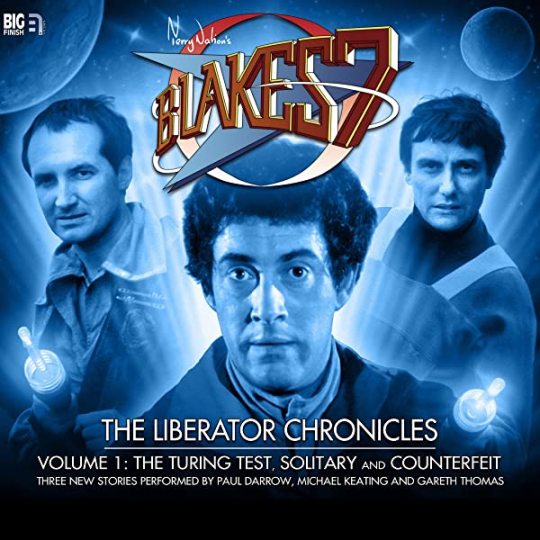
The Turing Test by Simon Guerrier
'After evading an attack by Cassini Pirates, the Liberator heads to the rogue moon of Quentil, where Avon and Vila infiltrate a top secret Federation science facility.
Vila assumes the guise of Dr. Yarding Gill, an expert in digital memory. And Avon is his "creation" - a super-advanced android that could pass for human. In fact, he does...
Can they maintain the ruse long enough to complete their mission? And will the Cassini Pirates catch up with them?'
Chronological Placement:
Series A - set after the events of LC Vol. 7's Disorder, between episodes Mission To Destiny and Duel.
This is a very well written story starring the late Paul Darrow as Kerr Avon, ably supported by Michael Keating as Vila Restal.
I love how the story is structured with Avon recounting these events AFTER the fact, like he was recording then for posterity into a dictaphone. I loved that Guerrier's writing didn't fall into the trap of having Avon try to do other voices or say 'said Blake', 'said Jenna' and so on. Nothing felt disruptive to the narrative and having Vila around never felt intrusive.
Kudos to Michael Keating for slipping back into the role of Vila Restal with relative ease. He will be quite reliable in a support capacity during many of these audios, and even get a chance at the spotlight... Which we will examine in due course. Right now, he lends his exceptional charm in this undercover mission posing as the scientist responsible for "creating" Avon.
Still, this story belongs to Paul Darrow, and he does a great job. It was a great story about what it means to be alive, what it means to be human and even serving as an examination of Avon himself. It was a nice inverse of the usual sort of questions regarding machine life wishing to be more human. Here we have a human considering himself to be more machine than man.
That is the interesting thing about Avon. Most scifi programs that deal with space travel tend to have an archetypical character known as the 'royal smart person'. For Star Trek TOS it was Spock, for Star Trek TNG it was Data, for DS9 it was Dax (and to a certain extent Bashir), for Voyager it was Seven of Nine, for Enterprise it was... Who the hell knows since everyone on that show was an idiot. As for Discovery... I honestly don't know cuz I haven't watched Discovery yet, but that's beside the point.
Avon is exceptional in his characterization only in that his desire to focus on pure logic and suppress his emotions does not come without its own drawbacks. Despite his intellect and skill with computers, he is someone that is also socially and emotionally cut off from others due to an inability to trust. He is also someone that sees the futility in giving over to emotional and irrational hysterics in order to showcase that he cares. Avon's intelligence also comes with a certain amount of ego, as he knows that he is smarter than many of his contemporaries, and much of the logic he embraces stems from a certain degree of self-serving self-interest.
His desire to assist in the situation with the AI android 14 stems from having an affinity with another creature of pure logic, and not wanting such a creature to be exploited and corrupted to further the aims and agendas of the Federation. This story is a great reminder of why Avon is a great antihero, as he is still willing to do the right thing in spite of himself.
Final Score: 8 out of 10 Plasma Bolts
Solitary by Nigel Fairs
‘Vila is in solitary confinement. His friends have abandoned him, his only contact with the world outside is Nyrron, a scientist from the planet Auron.
Amnesiac and confused, Vila attempts to piece together recent events... A mission to Dulcimer 4. An important meeting. And a visit to the jungle world of Terrulis Major.
In the depths of the foliage, the truth is waiting. And it's more terrifying than Vila could possible have imagined...’
Chronological Placement:
Series B - between episodes Redemption and Shadow.
I really do not have much to say about this story as it is profoundly unremarkable and is a major clunker in terms of execution of its concept, as well as the first person narration.
It has some interesting ideas, there is a central mystery that is interesting, with Vila finding himself in solitary confinement and abandoned by his friends, and we are introduced to a semi recurring guest character in the form of Auron scientist Gustav Nyrron, played by Anthony Howell ('Dr. David Keel' of the The Avengers: Lost Episodes range).
Nyrron himself is an interesting character as an ally for Blake and the Resistance, which begs the question why Cally wasn’t involved in this story as well. Because for an Auron scientist, he actually spends most of the time acting like either a reasonable interrogator or a benevolent psychiatrist for the imprisoned Vila.
The whole story itself is not executed terribly well. The Vila character spends a good chunk of the first few moments talking to himself, and then when Nyrron comes into the narrative, Vila spends the rest of the runtime being asked if he remembers certain events, and then goes on to basically recount events that lead up to meeting Nyrron and then goes on to tell Nyrron things that he already knows about.
As a Vila centric story, its also not terribly good, not even with certain unexpected revelations made. This story does Vila no favors and we don't learn much about Nyrron either. Fortunately, those are issues that would end up being rectified in later stories. Definitely give this one a miss.
Final Score: 4 out of 10 Plasma Bolts
Counterfeit by Peter Anghelides
‘The Bovee Mining Facility: A Federation slave camp worked by disgraced scientists.
The planet shouldn't be of interest but it is: Avon's investigations reveal that it's rich in Illusium, a mineral that can change from one substance to another. With it, the Federation could be invulnerable...
Blake teleports down to Bovee, but gets more than he bargained for. There's another visitor to the facility - and his presence changes the whole game...’
Chronological Placement:
Series A - set after the events of LC Vol. 1's The Turing Test, between episodes Mission To Destiny and Duel.
This is not a bad Blake focus story, with added support from Avon. However, what we get is a pretty standard adventure with Blake hoping to obtain certain materials and destroy the means of that material being reproduced in another effort to cripple the Federation's power. We even get in an appearance by Travis, Blake's personal nemesis, to lure him into a trap.
There isn't a whole lot to say about the story because of how standard and basic it all is. The fact that the story is done on audio does play in well into certain revelations and surprise twists made within the narrative. Many of which I will not speak on as it goes into spoiler territory. Other than that, the story itself is not bad, it is definitely worth a once-over. Its just unfortunate that it is also pretty average and fairly unremarkable.
Final Score: 5 out of 10 Plasma Bolts
Final score for Volume One of The Liberator Chronicles in its entirety is 6 out of 10 Plasma Bolts.
It isn't the best start to the Blake's 7 audio range as it really only has one story out of three to recommend it. Its great to hear the original actors back again, and thankfully they will be served better stories in the volumes to follow.
Special thanks to Craig Brawley of the Big Finish Listeners Facebook Group for his tireless efforts in mapping out the chronology of the audios and determining how they fit in with the established TV continuity.
2 notes
·
View notes
Photo

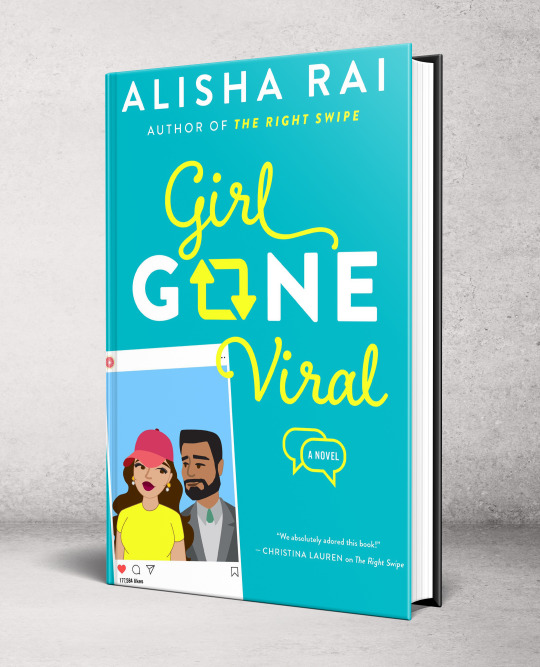
B O O K R E V I E W
╙ G I R L G O N E V I R A L B Y A L I S H A R A I
genre: romance, contemporary, new adult
publication date: April 21st, 2020
rating (1-5 scale):
writing: ★ ★ ★ ★
characters & character development: ★ ★ ★ ★
could-not-put-it-down factor: ★ ★ ★
general rating: ★ ★ ★ ★
*ARC received from the publisher via Edelweiss in exchange for an honest review*
WARNING: CONTAINS (MILD?) SPOILERS!
Recently, I got myself a reading date and took this book out for a quiet night in. The verdict?
I've got the zings!
In terms of getting into the story, this one took its sweet time to pull me in. But once it finally did?
I've been a goner.
There are still not that many authors who write romance the way Alisha Rai does and I think that's a travesty. Her stories are effortlessly diverse, socially aware, sensitive and well thought-out. Some might say this doesn't leave much room for romance but I wholeheartedly disagree.
Was the love story between Katrina and Jas one of star-crossed lovers variety or a fateful meet-cute over the last bagel in their favourite cafe?
Nope. But it didn't make it any less riveting.
At its core, "Girl Gone Viral" is a story about two people who have known and pined for each other for years, with only the recent extraordinary circumstances allowing them to slowly break out of their shells. It takes them some time to get there, but once they do - it's on. And what I loved about Katrina and Jas' relationship, apart from how incredibly respectful and supportive they were to each other, was how they communicated. Sure, it starts off with a bit of a "what does the other feel" guessing game but then they progress to talking about their feelings and there's no unnecessary angst or drama with breaking them apart for some stupid convoluted reason.
And you know what, I don't think it's easy to write a romance like that: full of passion - but quiet passion; full of love - but quiet "I've been eating breakfast you made for me every single day for years even though I don't really like breakfast" love; full of gestures - not grand but "I will help you get through a panic attack" kind (which makes them all that much grander, in my opinion). I was hooked all the same. I was hooked that much more.
I mentioned how effortlessly diverse Alisha Rai's writing is. For one, most of her characters are people of colour. While she writes F/M romance, she includes quite a lot of casual queer rep. And she tackles mental health issues like no other romance author I've read. In this book, Jas suffers from PTSD after his time in military and Katrina suffers both from PTSD and panic disorder.
While I'm in no way an expert, I could tell that Rai took great care and probably a hefty amount of research to write about these issues in a thoughtful way. Her writing covers a lot - from descriptions of copying mechanisms to random mentions of therapy sessions, which I think is a great way to help remove stigma still surrounding mental health.
I also loved how other characters in this story behaved. Katrina (and also Jas, to some extent) had a great support system in terms of friends and/or family. I'm always looking for all these connections and relationships on top of a budding romance - after all, people do not live in a void. Here, my craving was satisfied. Not only the author included some wonderful female friendships (YAY!), but I got some bromance too, not to mention a family working out their issues.
"Coddling was such an infantilizing word for respecting the wishes of an adult and encouraging them to take things at their own pace."
More than this, I LOVED how respectful (almost) everyone was when it came to Katrina's panic disorder or Jas' PTSD. Sometimes friends can be well-meaning but come off as condescending instead. Here, all Katrina's friends as well as Jas trusted and respected her wishes and knew that she knew her feelings and limitations and how to handle them best. This may seems obvious but it's not. Same with respecting other people's personal space! As a person who HATES being touched without warning and/or permission, I practically purred with happiness any time someone ASKED before giving Katrina a hug.
Since this series and particularly the premise of this book deals a lot with internet and modern ways of romance, "Girl Gone Viral" also tackles a very relevant topic of right to privacy, anonymity in the internet, cyberbullying and more. I thought this was a very interesting and important take on it, from a perspective of Katrina who is someone who not only wants anonymity, she needs it to feel safe. And when that anonymity is threatened, she feels violated.
I remember some time ago there was a thread on twitter that had gone viral, with someone (supposedly) live tweeting some couple's meet cute and conversation in the cafe - perhaps it's the very same that inspired the premise of this book. At the time I thought it was harmless and cute, but this story made me look at it from a different angle. Not everyone wants to be famous. Not everyone wants to be a trend on twitter.
Just food for thought.
Again, some might say all of this felt "too preachy" or "too politically correct". And yet again, I wholeheartedly disagree. Is it such a radical concept, to write about people being kind and considerate? What is being "politically correct" other than simply being mindful of others? Should love stories only be reserved for white, thin, perfectly healthy people?
Just more food for thought, I guess.
"Happiness is a radical act."
This book made me feel so much. I was engrossed and invested in the characters and their happiness. And because of all that Katrina and Jas went through, it made me think about how hard it actually is to be happy, truly happy, in today's world. It takes strength and courage and not a small amount of hope to push forward and push yourself, work on your issues or keep doing what makes you happy, even when some people insist on knowing better what's best for you and what you "should" want.
Yet, their story left me feeling strangely optimistic and happy. Maybe because of the wonderful support system both these characters had. Because, it seems to me, as long as you surround yourself with the kind of people who love you and are right for you - happiness is not such a radical concept after all.
Trigger / content warning: PTSD, graphic descriptions of panic attacks, mentions of parental abuse & emotional abuse
#girl gone viral#modern love series#nadaily#book recs#bookworm#litedit#bibliophile#alisha rai#book reviews#our reviews#by kate
14 notes
·
View notes
Text
This Has Bite
Bday/secret santa gift for my dearest Isaac... I have not read or watched Golden Kamuy at all please don’t take this as a serious fic the goal was to write a story strictly based on what I’ve glimpsed of the GK characters thru Isaac’s tweets
Rating: T
Warnings: uhh lots of implied stuff
Words: 2,900
This Has Bite
His mother used to have a name for it. For It. 'The Issue with Hyakunosuke,' she called it, when reports would come out of his primary school of him doing all that was asked except what was asked. She was not one to shake or scream, not for such base violence as to hit him either, but she would pinch her lips and suck in her cheek and talk of The Issue with Hyakunosuke.
It made her look like a ghast, Ogata thought then, seven years old and as dead-eyed as she was. He had even then grown to be more like his father than her: thick-set and thick-fingered, whereas she always seemed a gasp away from flying, so thin she was. So when she pinched her lips and sucked in her cheeks, her face became all long and noodle-like. It seemed to lengthen two inches all of a sudden.
The dead-eyes did not change, however.
The Issue with Hyakunosuke was not that he was a shut-in gamer like so many of his peers, or that he ate too much and became overweight, oh no. She could have fixed both easily enough. The Issue with Hyakunosuke was that he only ever did what he wanted to do.
For Ogata's mother, who had never done anything she ever wanted and always resented everyone who did, this was a worse crime than having an obese, gaming son.
Kiroranke opened the lavish door to his lavish house, blinked open his wet-bright eyes and shook his head, making his lavish hair bounce as if he were forever stuck in a shampoo commercial.
"Honey," he called over his shoulder to absolutely no one, ever-single bastard that he was, "I fear I've become senile."
"Spare me," said Ogata evenly.
"No, truly, I am seeing things."
Ogata shoved the flowers into his face. The one florist of the village, who had reacted about the same as Kiroranke upon seeing him enter her shop earlier, had wrapped the chrysanthemums in lovely pale-blue paper. Her hands had worked with the strength of habit alone, so busy was she oggling him and asking The Good Doctor invasive questions in a nasally voice. The paper was fine and easily-torn, and so it tore around the peak of Kiroranke's nose and dented everywhere.
"I feel the need to inform you that this party is not, in fact, a funeral," Kiroranke said after plucking leaves and white petals out of his hair. He made a grand gesture with his hand; Ogata entered the house, looking resolutely to his feet in boredom, and ignored him. "It's Christmas."
"It's the seventeeth of January."
"It's Christmas and the New Year all wrapped in one. Doing things on time is so passé."
"How fashionable of me to arrive now, then," Ogata muttered as he took off his shoes, put on the, once again, lavish slippers let to the guests, and kicked Kiroranke's golden boots askew for good measure.
He hated this house. He hated Kiroranke. He didn't even celebrate Christmas, never did, not with his mother so noodle-like at the mere thought of embracing western idiocies.
"Oh my," Kiroranke said in that stupid, girlish tone of voice Ogata hated more than anything. He leered at Ogata's suit heavily. He even pursed his lips and rolled a strand of carefully iron-curled hair around his little finger. "You dressed for the occasion. One has to wonder what could possibly bring you out of seclusion, good Doctor."
He smiled; his horrible, crooked teeth shone in the golden light of the hallway. Ogata ignored him and made his way through the unfortunately familiar path leading to the living-room.
Kiroranke's house was an aberration of modern, traditional, western and Japanese. All guests had to leave their shoes at the door, but then wore handmade fur slippers Ogata was pretty certain Kiroranke sewed by himself. Golden and muted light shone out of contemporary lamps lined all along the walls in smooth and twisted shapes, and stuffed animal heads were hung on walls alongside preserved fish bones. The man himself could not seem to pick just the one fashion style either: he now wore an exquisite women's yukata, in tones of white and pale pink and sewn with delicate flowers, which he would probably pair with those horrid boots in the entrance whenever he decided to take the party outside.
Thankfully, Ogata would be long gone by then. Half an hour was all he would allow this farce to last.
As expected, the living-room was as crowded as any place of this godforsaken town could ever hope to be. Kiroranke had even graced his hosts with more room, if that was possible, considering how vast the estate he lived in was: he had pulled back his bookcases and vanished the expensive TV, moved away the low tables, cleared the carpets from the floor. Still Ogata felt a migraine coming just seeing so many people in the same space, half the village it seemed, along with all their children. The mayor was here talking to Shiraishi; the one school teacher he knew to have a bad case of sugar addiction was sitting in corner, nursing a crystal flute full of sparkling something; and, of course, the new owner of the long-abandoned dojo was making her voice clear and loud.
Ogata ignored Kiroranke's meek laughter. He ignored as well the progeny of all these people, running around his knees and everyone else's in a merry game of tag—of course they just had come with their children and allow them to riot. Everyone wanted a piece of Kiroranke's wealth, and he was always so kind as to gift his guests with tasteful attentions. Especially children. There would be a Christmas tree somewhere with twenty presents at its feet.
One of the children in question was rougher and taller than the rest, and louder too. She screamed and howled as a boy half her size grabbed her elbow and made her it in turn. At least whoever owned the little monster had known better than to dress her in a yukata, for her pants, rolled up to the knees, were already stained with grease and other things.
As Ogata watched, the girl, if she could be called such, howled in a frightening imitation of an actual wolf and tackled another boy to the floor. "Not fair, Asirpa!" the boy gasped, but she was off him already and running away in glee. Her black hair stood on every end.
"You'll need to sanitize your house after you're done," Ogata advised Kiroranke.
"I always knew you had a sweet spot for kids," Kiroranke replied inexplicably. "Come, have some sake. I've got just the thing for you, dear."
He would pay for the endearment, Ogata mused, on his next bimonthly scaling. Not that Kiroranke would even notice a few thousand yens of difference in price.
He had better things to think of anyway as he followed Kiroranke to the long and narrow table shoved against a corner of the room where usually a full-sized bear stood. One of my earlier kills, Kiroranke had said the very first time Ogata had come here, and to this day Ogata knew not if he had been joking. He looked around the room again, navigating between throes of guests dressed in their Sunday best for the occasion to stand amidst luxury, and all the sounds of their voices were like insect buzzing near him.
All but one.
She was talking to Shiraishi now, and holding the wolf-girl by the ear—she must be hers. It made sense. Ogata's mother always said bad blood willed out, and that Ogata himself was the portrait of his grandmother—her own mother, whom she hated more than anything else, and she hated a lot.
If he had been a woman and more alike to her in appearance, his own face would be thin and long now, just looking at this stranger.
She was smiling, her lips closed, those ugly scars on her face stretched and twisting every way. Her eyes were bright under the chandelier, and poor Shiraishi looked buzzed already with whatever deep-dark drink was in his glass and smothered by her very presence. He smiled stupidly at her. No doubt his teeth would be yellow again on his next appointment. As Ogata watched, the woman gathered the wolf-girl against her side with easy strength, and her shirtsleeves bulged over tan and veiny forearms.
"You'll want to greet everyone, of course," Kiroranke was saying now, annoyingly, for his loud voice covered any hint of what the woman was saying to the girl. They were on the wrong side of the room as well: the woman was near the hearth where a joyful fire burned, warming up the air almost as much as bodily heat did, whereas the table with the drinks was all the way across. Kiroranke unsealed one of the three bottles of sake warming over a little stove, and poured some into a tumbler for Ogata. "So long since we've seen you out of exile, my friend," he said as he handed it to Ogata, "you really must start going out more. So much you are missing!"
"There's nothing to do here I haven't done a thousand times before," Ogata replied. "This place is all of ten streets wide."
"Nonsense. Why, just this week, I've had such delightful outings with four different families. Did you know Ogoro's daughter is single again? I hear she threw her boyfriend out for cheating on her with little Misaki. Little Misaki! Can you imagine? I still remember when she only reached my knee."
Not for the first time, Ogata congratulated himself for studying dentistry. He was spared almost all village gossip by his patients being unable to speak while he saw to them.
Kiroranke's speech kept flowing enthusiastically, as he recounted to Ogata how this or that family was faring, or which son or daughter had moved the city this year and left their ancestral land behind. He shook his head, desolate to mention it, making his curled hair shake about his face and catch the light goldly and remind Ogata, not for the first time, of the brief two months he had spent near-obssessively watching it move after first meeting Kiroranke.
Truly not one of his most brilliant obsessions. He had felt something like relief back then, when Kiroranke didn't seem hung up on him. He had not anticipated that instead of taking the role of spurned lover, Kiroranke would fashion himself his friend.
Ogata drank his sake and did not listen to Kiroranke's blabber and watched the stranger in the room whom everyone else was also looking at.
The wolf-girl, Asirpa, had escaped her. She was running again with the boys and girls of other families, who seemed to want to call them back but were afraid of looking rude—or perhaps simply afraid of the woman herself. She did teach at the dojo, and rumor had it she had been a boxing champion in the past. Her face, with those ugly scars, was not so reassuring either, no matter how loudly she laughed.
"I see, I see," said Kiroranke all of a sudden.
Only then did Ogata realize that he had been silent at all. He tore his eyes away from the woman to look at him instead. "What?" he asked plainly.
"You are curious about our newcomer as well." Kiroranke shook his head of glorious hair purposefully, powerfully. "Ah, I knew she would catch your attention. Let me introduce you, my friend."
"Let's not."
But there was no use in saying anything, and anyway, this suited Ogata well enough. "Sugimoto-san!" Kiroranke called. The woman with her scars and bulging forearms and mannish haircut turned to him immediately with a smile. "Come here, there is someone you need to meet."
As she approached, wading through the dozens of people somehow packed within Kiroranke's living-room, kitchen, and garden, Ogata felt rather like a cat staring an unknown creature down with all of its hair erect. Her outfit was exactly the same as it was the last time he saw her. All the beautifying she must have done for the party was to slick her short hair back and put on some simple jewelry—and even that was less delicate than blocky, consisting of a thick bracelet around her wrist and plain gold rings on her fingers. Her nails were short, unpolished.
Still she emitted more presence, in her very boring jeans and shirt, than any woman around wearing their mothers' best.
"Come closer, dear," said Kiroranke to her, and unlike Ogata before her, the woman did not at all frown to be addressed in such a way. "Come meet our good doctor."
The woman looked at Ogata. Her eyebrows flew up in surprise, then her lips twisted sideways. The scars running through her cheeks shifted and curled.
"I know you," she said in the very same brash voice she had used when they first talked; "You're that dentist I saw!"
"You've already been to his office?" Kiroranke asked gleefully.
"Yeah. I take dental hygiene very seriously. Bringing Asirpa next week too, that girl eats and acts like a bear and isn't so keen on washing herself up afterward."
She spoke of her own kid so without shame. The other women in the village would rather bite into lemon than imply their daughters be less than perfectly marriageable, and Ogata's mother would have bitten into five lemons in a row rather than admit to anyone but Ogata himself just how unbearable she found his presence, but this woman, this Sugimoto, only grinned.
Her teeth, fake and real alike, were absolutely spotless.
"Good to see ya again, doctor," she said, holding up her hand rather than bowing. "It's nice to have a dentist so close by. Didn't expect to find one unless I went to the nearest city."
Ogata shook her hand. Her grip was firm, her palm callused, and strength ran down the length of her fingers as if to close them around his warranted force of the shoulder.
"Ogata has been with us for, oh, ten years now," said Kiroranke, grabbing their linked hands in his against all propriety and squeezing them tightly. He looked as merry as a grandmother sealing a well-made arrangement. "To think he'd stay so long, and still refuse to have a social life at all."
"Why'd you settle here, doctor?" Sugimoto asked him.
She didn't seem to mind at all that their hands were still held within Kiroranke's wide grip.
Ogata found his voice again. "I love the locals," he replied.
Kiroranke laughed himself into tears.
He unhanded them as he did, and Ogata let go of the woman's hand as soon as she showed sign of taking it back. He watched her grin at him; watched the two rows of white teeth in her wide mouth glint, perfectly aligned.
The Issue with Hyakunosuke was not something he had to deal with again since childhood. After his mother died, long after his father left them, this obsessive nature of his faded and became but a memory, only occasionally stroked to wakefulness again. He had felt something of the kind when meeting Kiroranke a decade ago, but even this had vanished after the one time they slept together and Ogata got his fill of touching that infuriatingly lustrous hair.
Since then, only glimpses had shown themselves. The sight of the mountain on spring mornings, when the day rose early enough that he could watch the sunrise as he walked to the office. The taste of the warm sake brewed in the nearby tavern in winter. A few old black-and-white movies he sometimes replayed on his fairly unused Blu-Ray set.
Then the woman had come to his office a week ago, unknown to him and to the lone elderly man already waiting there, wrapped up in too few layers for so cold a season in Hokkaido. She had lain on the chair in silence, let him clean and examine her dentition. He had found the places where her gums had scarred, the difference in light and color—such a faint difference—between real and fake teeth. Whoever had fixed her up had done so nearly artfully.
"Thank you, doctor," were all the words she said to him as she paid him.
"Don't lose any more teeth," Ogata had replied.
The woman had stilled. She had stared and frowned at him. And then she had grinned, much like she was grinning now, and picked up her coat and scarf with those wiry hands of hers.
Even now, as she talked enthusiastically to Kiroranke without looking much at him, Ogata could see people sneaking glances at her and whispering amongst themselves. He had done something like research on her himself—gone to the tavern two days ago and allowed the two old woodcutters who always drank there at night to speak over him, sharing loud rumors of her being a criminal or a hooligan, come from Tokyo or another such nonsensical place. They were 'fraid of leaving their wives alone at home, now. They said she worked at the dojo, looking to teach kids from the school to box, not at all ladylike.
Sugimoto's eyes sometimes strayed from Kiroranke to look around. They settled on her kid, the wolf-girl, on the garish décor of the villa. They ignored the glares and whispers as if those could only knock off of her like arrowheads on steel armor.
Ogata drank his sake silently, stared with dead eyes at the old women in the back until they bowed with shame and their voices lowered.
He thought that if his mother could see him now, her face would thin down and length infinitely.
His smile was ugly, he knew; which was why he did not smile at all whenever Sugimoto looked at him.
2 notes
·
View notes
Text
Book Review: ‘Dreamland’
Dreamland: The True Tale of America’s Opiate Epidemic by Sam Quinones
In Dreamland, Sam Quinones tackles the current opioid crisis in the United States with impressive thoroughness. His goal in researching the epidemic was The Big Picture---unfortunately, such comprehensiveness may not be possible. Nonetheless, he does an admirable job, making Dreamland one of the few should-reads for contemporary America.
There is a lot in this book. Broadly speaking, the material can be divided into two basic categories: the legal, and the illegal (specifically represented by Oxycontin, and Black Tar heroin, respectively). Broadly speaking.
On the legal side, Quinones interviews doctors, researchers, nurses, clinicians, patients-cum-addicts, Oxycontin dealers, and families of the lost; he has chapters on the poppy plant, opium, and morphine; he discusses Arthur Sackler and the rise of pharmaceutical marketing, which included the wooing of doctors; and he traces the history of pain treatment---the medical treatment of pain being one of the largest enablers of the opium epidemic.
It’s hard to call what occurred in the medical establishment an overt conspiracy since, outside Big Pharma, most intention was good. Most.
It began because opium derivatives are pain killers---and the pain-killing properties of opium are ancient news. Also well-known was the fact that opioids are addictive, and use was restricted and monitored. Cancer changed that, with doctors advocating the use of morphine, etc. for end-stage cancer patients who were dying in horrible pain. At that point, it was a quality-of-life issue, and the campaign was successful.
Unfortunately, around the same time that pharmaceutical companies were honing their marketing skills, and developing opium-derivatives, medicine decided to extend the quality-of-life logic to all forms of pain. Injured? Opioid. Chronic back pain because you don’t lift with your legs? Opioid. Whatever the pharmaceutical company had, that was the solution.
And as for that habit-forming problem of opium-derivatives? Turns out, according to an infamous “study” referred to as Porter and Jick, opioids aren’t really that addictive after all. That Porter and Jick was really just a letter to the editor noting one pattern in a limited pool of data either didn’t matter, or, more probably, was never known by the people who cited it (a couple of whom Quinones interviews). Yes, bad science became a major contributor to our opioid crisis. No one checked the “study” that was repeated ad nauseam, and few paid attention to the data at hand concerning the high rates of addiction in patients who were prescribed Oxycontin.
Insurance companies didn’t help matters. They’d pay for prescription medication, but not for physical therapy, psychotherapy, nutritionists, or holistic/ multidisciplinary approaches to pain treatment. So doctors who wanted to use those non-pill approaches were put out of business.
But that’s just the legal opioids. On the illegal side, Quinones focuses on Black Tar Heroin, a viscous, dark-colored substance that’s as pure as heroin can get. He interviews cops, dealers, DEA agents, addicts, lawyers, and community organizers. And because he follows the Black Tar, he discusses Xaliso, a city in the state of Narayit in Mexico, where the heroin was grown.
Black Tar heroin dealers changed the game. Just about everything about them confounded police. The dealers didn’t carry guns, didn’t fight turf wars, and feared local gangs. They didn’t use, and they didn’t adulterate their product by cutting it---they didn’t need to as there was no multilevel distribution line. They delivered to their customers, carrying a minimum of heroin, so if caught, D.A.s rarely felt they were worth the time, and they were just deported.
Deportation was not a deterrent. The Xalisco Boys, as Quinones calls them, dealt heroin in order to make money and be the Big Man struttin’ around town back home. In the United States, their lives were spartan---the point was to go back home to their sugarcane-farming town, having struck it rich. Unfortunately, the dealers spent too lavishly, didn’t invest or save, so money ran out, and they had to return to the U.S.
The system the Xalisco Boys had was capitalism at its finest. No corporate headquarters, no cartel bigwigs, just small entrepreneurs competing in an open market. They had excellent customer service. Not only did they deliver like pizza, they offered samples, and deals. Addicts would get extra heroin for introducing a new customer. The Xalisco Boys would pay (in heroin) for an addict to hand out samples at the local methadone clinic. They’d exchange drugs for your name on an apartment or car lease. And when word got back to Narayit of ripe territory, a gold-rush mentality set in, and more cells would show up in town to compete for the same customers. Prices dropped.
Besides being non-violent in general, in Xalisco, the culture included webs of long-standing family feuds that few wanted to challenge. Because if anything untoward happened in the U.S., it *would* get back to Mexico.
Thus the more adventurous dealers would strike out for new territory. If an addict happened to know of another possibly-lucrative town, they’d introduce the Boys.
One dealer Quinones interviews, called The Man, was actually born in the U.S., and entered the Xalisco system from the outside. Of Mexican descent, he spoke English and Spanish, and recognized the relevance of Oxycontin to heroin sales (most of the Xalisco Boys didn’t bother learning more than functional English, so didn’t see the bonanza). He was arrested before he could really pave the way, but others did so after him.
Part One of the book ends with the arrest of numerous dealers in multiple states in one of the largest, most coordinated operations in drug-enforcement history. But the insidiousness of the Xalisco system is that it’s self-renewing. Arrest one guy, someone else will take his place. As long as there’s demand.
As I stated above, there is a lot in this book. Quinones manages this plethora of information by “braiding” or “juggling” it: he tells the story of the family of a young man who od’d; introduces a dealer called Enrique; moves to Dr. Herschel Jick wondering about rates of narcotic addiction in patients at his hospital; reveals how Dr. David Proctor came to Portsmouth, OH (he wasn’t able to interview Proctor in person); Enrique again; a cop in Denver; the morphine molecule; Proctor; Enrique; a cop in Idaho; Xalisco culture---this is not the actual order he goes in, but it is the gist of his technique. He touches base with each thread, showing how they interweave. It’s an interesting approach that I think works well for the material, but it did get difficult sometimes to remember who was who. I’d use the index in those cases.
Two limits before I end this already long review. First, the heroin angle is limited to the Black Tar out of Xalisco. Other heroin dealers, gangs, cartels, etc. are mentioned only when relevant to Black Tar and the Xalisco system. So, for example, the Xalisco Boys avoided New York City like the plague, so not much about the presence of heroin there in Dreamland.
Second, racism is prevalent throughout, but not explicitly explored (this is a limit, not a detraction). The Xalisco Boys would not deal to blacks if they could help it---mostly out of fear derived from prejudice. But the far more subtle forms of racism, especially in the predominantly white middle-American towns exist like smog---it’s there, it’s not good, but those immersed in it stopped noticing. Quinones points it out a couple of times, but the degree to which it’s relevant is up to the reader (since his topic isn't the various connections between racism and drugs, he may have decided to just let instances of racism stink up the background and not turn Dreamland into a doorstop).
Highly recommend this book.
#book reviews#Dreamland#author: Sam Quinones#booklr#opioid crisis in America#Oxycontin#black tar heroin#pain management#drug enforcement#Portsmouth#Xalisco Narayit#Porter and Jick#bad science#not doing the research#so much info#fascinating read#highly recommend#autocorrect keeps insisting the Mexican town is Jalisco#which is a legitimate spelling#but not the one Quinones uses#my stuff
4 notes
·
View notes
Text
qb anime-watching list for Summer 2019
Hey I know how much all you folks love uninformed digest predictions off limited information so here are some - qb

Definitely Watching:
Vinland Saga
You know what this is and who the author is since the manga’s been going forever, the animation looks pretty alright and this portion of the story they could cover is tightly paced, strong seinen. Even if they mess that up, there’s no way they could mess up the first chapter, so at a minimum I expect the pilot to be memorable and for a hundred gifs of Vikings to grace my twitter feed. Not much else to say about it, people might be expecting too much from the production, but it could also live up to those expectations.
youtube
Carole & Tuesday (continuing)

Carole and Tuesday’s great, has had some of the best musical performances of any anime already, and all the singing being in English makes it very easy to listen to. The parts that aren’t explicitly a musical performance are less memorable, but those are also pretty good sometimes. I’m not dropping this anytime soon.

Star☆Twinkle PreCure (continuing)

Star☆Twinkle PreCure is a more or less normal season of modern Precure, which is fine. It's not lighting the rulebook on fire and hurling it out the window like Hugtto Precure, but it is taking some risks, like acknowledging Japan's problems with accepting interracial couples and emphasizing that integrating with other cultures is not only good but desperately needed in all levels of a functional contemporary society. The way it’s tackling these complex issues is sometimes a bit too simplistic and indirect, but the diversity of the planets, people, and themes in this season is refreshing in its own way, and probably was only possible because Hugtto blew open the doors first. It’s also one of the funniest seasons and that’s what we all probably need right now.

Kiratto Pri☆Chan (continuing)

Pretty Rhythm’s second major reboot spent a year being relatively grounded for the franchise, but has slowly loosened its grip on reality and now it’s almost fully back in weird, self-referential madcap pseudo-idol garbage. Characters from other seasons are just showing up now on the regular and the iconic bizarre inhuman pupils have come back stronger than ever (see above and below). It’s a lot more like an unrestrained cartoon now, which is where Pretty Rhythm is most entertaining, because it wasn’t cutting it by normal means.
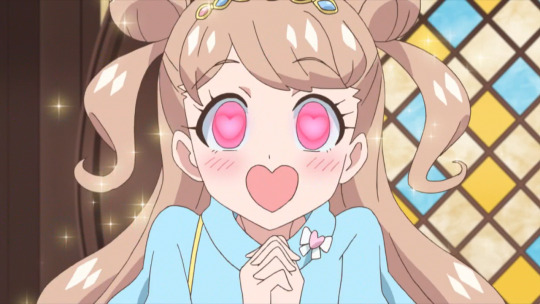
Maybe Watching list:
Symphogear XV
Symphogear’s generally watchable but I wasn’t too hot on the last season, and watching it on any regular schedule has been made problematic by the sudden unexplained lack of licensing overseas. I don’t have faith that Crunchyroll will skip or pick up AXZ and license this one out of order, so it may be more prudent to wait to marathon this season all at once at a later date, which I feel is the best way to experience a season with as much raw momentum as this series.

Whatever Lerche’s Music anime is
Frankly, it’s been a long time since Scum’s Wish and School-Live, and every season I feel less hype for Lerche’s mediocre-sounding output. This one also sounds mediocre.

Ensemble Stars!
David Production anime adaptation of an idol raising game only this one is boys. It has the same director as the current anime of King of Prism and they might have hinted at a connection between the two shows so I’m gonna watch it for Lore Reasons. If there’s no Lore I’ll probably drop it.
youtube
Trash List
That Mom Isekai
Also known as Tsuujou Kougeki ga Zentai Kougeki de Nikai Kougeki no Okaasan wa Suki desu ka. I was gonna trash-watch this one out of curiosity and an expectation that it would reach new depths of anime garbage but the first volume of the manga I saw in a bookstore was enough to turn me off of this series permanently even as a joke. I will admit the central conceit of “you can’t leave the virtual world until you get along with your mommy” is kind of funny but in practice the author couldn’t make it 5 minutes without crossing the line of utilizing the mother for harem fanservice and that gets exactly as weird as you’re thinking.
The official twitter is called “https://twitter.com/okaasan_online” which is hysterical so I will give props to whatever PA managed to get that @.
Machikado Mazoku
It’s an adult-oriented gag magical girl parody anime. The last one went so good they just had to make another. It gives off a selling hug pillows energy and every single entry in this subgenre is cursed so that’s why I put it here. I have to watch one episode because of my death pact but I don’t expect much.
Re:Stage! Dream Days♪
This has a strong chance of being the worst anime of the season. the phone game’s twitter was nothing but middle schoolers in wedding dresses as an event for an idol raising rhythm game and its all red flags. Most likely don’t watch this
5 notes
·
View notes
Text
A Rag and a Bone
As some of you saw, I found one of my “lost” Doctor Who holy grails, Daniel O’Mahony’s A Rag and a Bone! I’d been hunting high and low for this piece of fiction because the idea of O’Mahony writing a Sabbath-centric story was too good. There was literally no information whatsoever online as to what the story was actually about, but I love O’Mahony’s writing and the idea of him tackling Sabbath seemed like a match made in hell.
Finally getting a hold of this story, I must say that calling it “a Sabbath story by Daniel O’Mahony” is incredibly disingenuous, and while I dissect this story and share it all with you, I have to be completely honest and say that I have never been more confused at such a short piece of fiction in my life. Delighted, mind, but very confused.
This story was published in 2003′s Myth Makers Essentials, the famous fanzine’s special 40th anniversary celebration. Myth Makers has been rather a white whale of mine, most long out of print issues holding onto other holy grails, most notably Parkin’s Saldaamir and The School of Doom.
This story is more than a Sabbath tale, being a celebration of Doctor Who’s history, the history of the humans who keep Doctor Who going, as well as a celebration of the 2003 BBC prose continuity that, for all intents and purposes, was the Doctor Who at the time alongside Big Finish’s 1999-2003 years.
It’s also written by one of the closest things Doctor Who has ever had to Clive Barker, meaning that it’s a very disturbing celebration.
O’Mahony introduces his story with a discussion of what he considers one of Doctor Who’s essential elements:
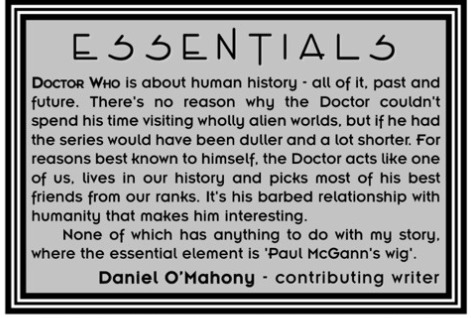
In O’Mahony’s view of the series, Doctor Who is about humanity. Human history, ingenuity, sacrifice. Without humanity, Doctor Who is nothing. It’s a much more grounded view on the series, and while I’m not sure I quite agree with it, it makes literally every Doctor Who story O’Mahony has written make a lot more sense.
I go into the story’s eccentricities and references (SO MANY REFERENCES GUYS, I’M SO HAPPY) under the cut. Reminder that a) O’Mahony, while a beautiful writer, is a very brutal one; his whole brand is painting objective horror and worldly ugliness in the richest, wine-like prose ever, and it’s definitely not for everyone, and b) this story, like Bidmead’s wonderful With All Awry, is far less literal than it is figurative. The continuity of the time is a factor in the story, but it’s rather useless to try and squeeze it in anywhere, that’s not it’s point.
A Rag and a Bone is an author’s thesis on the spirit of Doctor Who, as well as a simultaneous criticism and celebration of its state in 2003, all the while managing to use Sabbath in the manner he was intended, rarely seen outside of Lawrence Miles’ writing.
I’m not doing every passage of the thing, just the meatier ones. Enjoy and watch me stretch my English degree!
(Note, the story starts in first-person from Fitz’s POV, shifts to weird surreal mix of Fitz and O’Mahony himself, back to Fitz, and then ends with third person omniscient.)
The story opens up simply enough (which, given what appears to be going on, it’s really funny to say “simply”):
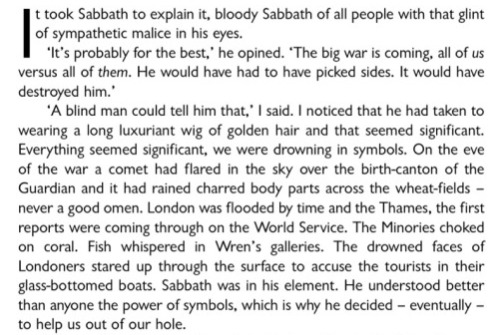
Already, this story seems to be following the beats of The Adventuress of Henrietta Street, the idea that in the universe without Time Lords, the universe is free game and humanity (led by Sabbath) needs to step up. But, it’s also a meta commentary. The passage is vague as to what’s really going on, but I think the war/looming disaster is something very specific, that I’ll touch on later.
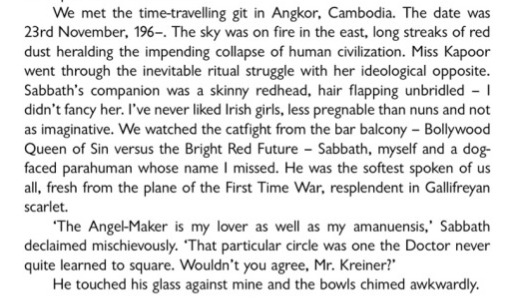
1) The date. Lmao. What could that possibly be a reference to?
2) Sabbath frequently had agents and allies throughout his novels, and one of these two, the Angel Maker, is actually from Lloyd Rose’s Camera Obscura. I don’t know if that gives an idea of the placement, or just further shows O’Mahony’s “I’m playing with current continuity” schtick.
3) “Miss Kapoor went through the inevitable ritual struggle with her ideological opposite [...] We watched the catfight from the bar balcony - Bollywood Queen of Sin versus the [Angel Maker]...” Perhaps a smirking jab at the rules or sterotypes of storytelling? Set certain characters against the idealogical opposites. Anji often went toe-to-toe with the ideologies and beliefs of people in her novels, far more than Fitz or the Doctor did, so I think that’s what this is a nod to, wrapped in the story’s theme of ritual and symbolism and framed as “the Doctor’s female companion must face Sabbath’s female companion in a duel!!!!!!!”
4) “... a dog-faced parahuman whose name I missed. He was the softest spoken of us all, fresh from the plane of the First Time War, resplendent in Gallifreyan scarlet.” This is Wardog (or a contemporary of Wardog), originally from Alan Moore’s DWM Black Sun Trilogy, portraying the First Time War. He had been recontexualized into Cold Fusion/The Infinity Doctors’ canon in Lance Parkin’s Executive Action, published in 2001′s Walking in Eternity, making him an (admittedly tangential) interesting cog in the EDA’s history and continuity.
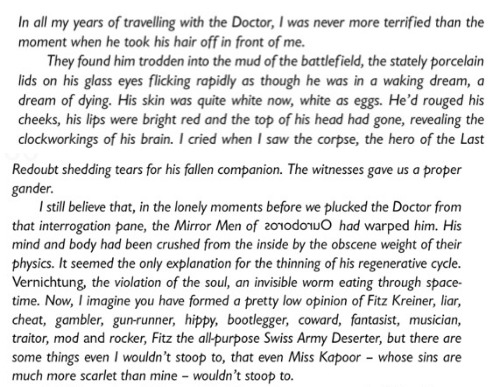
1) First time reading this passage, I couldn’t decide if this was purely Fitz or O’Mahony inserting himself into the narrative... and then I realized it’s both. There are two major critical takes on the companions, and this is the first: the role of the companions in the series is to give the audience someone to relate to and, in some cases, live vicariously through. Enjoying the adventure, experiencing the sights, etc. This section is both Fitz Kreiner and Daniel O’Mahony, trying to make sense of what’s going, while the story is already giving us the implications that, despite trying to create a narrative of the Doctor’s condition, he is actually not real.
2) Marvel at Fitz dragging himself in every possible way. Maybe a reference to how the novels (since the VNAs) really hadn’t had any qualms with pushing the flaws and imperfections of their characters? O’Mahony in particular is a writer who would go into great detail about how flawed people were.
3) “... Miss Kapoor - whose sins are much more scarlet than mine - wouldn’t stoop to.” I choose to believe this is a slight reference to how Anji was treating by some writers at the time. The EDA authors wither loved Anji, or hated and demonized her. I could be reaching with that one, but it doesn’t quite make much more sense otherwise. Maybe a reference to her earlier distrust and betrayals of the Doctor (such as in Mark Clapham’s Hope?)
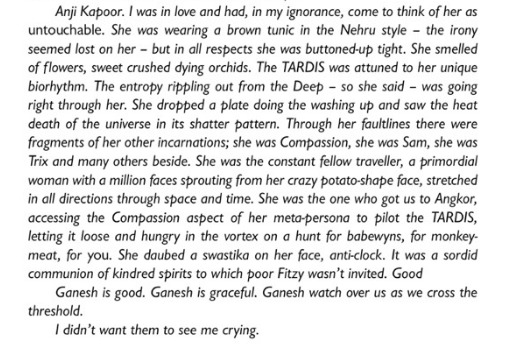
1) This is why I think O’Mahony was attacking the negative handlings of Anji, because the description of her character in the first few sentences is so... good. Beautiful, caring.
2) “The entropy rolling from the Deep...” I’m convinced that, in the end, the threat coming to destroy the universe, the stagnancy, the entropy, the “war,” is Doctor Who’s continued cancelation. Its the 40th anniversary, fourteen years since the show was cancelled, the series kept alive by a small and committed group of book readers and BF listeners (during BF’s early years). I’m adamant that the Wilderness Years produced some of the most creative and original Doctor Who ever, but it is very easy to see why people considered continuing the story a losing battle. More and more, the series slipped out of public consiousness and become more and more of an exclusive cult
3) The second critical take on companions in Doctor Who is a negative one (but one that needs to be said in some cases): in the end, they’re all interchangeable. None of their backstories or quirks matter in the end because they’re interchangeable stereotypes that need to stand their and ask the Doctor questions. What’s gorgeous about this sequence is how it tackles that idea in such a meta and independent way. Anji, realizing that she is, in fact, the latest face in a countless list, takes power from that. She reaches back to her predecessors and uses their abilities, their attributes, for her own agenda, all the while dressing as Anji Kapoor, praying to Ganesh as Anji Kapoor, being the unique and seperate entity that is Anji Kapoor.
4) “Babewyns.” The Ma’lakh grotesques, the villains of The Adventuress of Henrietta Street and one of the major elements in Faction Paradox.
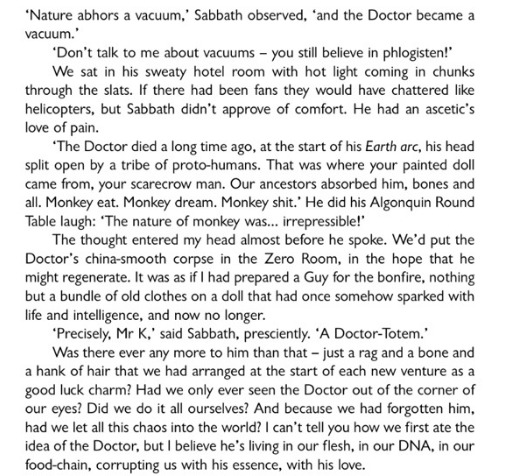


This section operates on two levels, both fictionally and metafictionally. The idea that the Doctor is now a vacuum and Sabbath must either fix or flat-out replace him is the central conflict of their relationship and adversity throughout their novels. There’s also a pun on the EDAs’ “Earth arc” which was the start of the status quo that brought in Sabbath. But, you’ll notice, the “Earth arc” here is not The Burning... it’s An Unearthly Child. Sabbath’s (very morbid) take of what happened to the Doctor isn’t the plot of the EDAs, it’s the beginnings of Doctor Who. The Doctor became part of human consciousness in 1963!
So why is the Doctor now a puppet? A doll, an inhuman echo? Because the show is cancelled, and despite the series living on through, there’s this overwhelming feeling that maybe, just maybe, the final end is fast approaching.
(Actually reading this theme in a story published two years before the show returned is rather nice, isn’t it?)
Sabbath’s take on this is, of course, negative and condescending, while Fitz focuses on the positivity of the Doctor. How he brings goodness and love into our lives, and that by “forgetting him,” (the show being cancelled) we’ve let horrible things into the world. That what Fitz is traveling with is the idea of the Doctor, the “totem” of what’s left, pushing through because Fitz/O’Mahony/the authors/the fans are still holding onto him.
This section also shows how Sabbath really, in the end, cannot replace the Doctor. His best appearances outside Adventuress (Parkin’s Trading Futures and Rose’s Camera Obscura) stressed his limitedness, his flaws, his (debatable) inability to rise to the occasion. He talks to Fitz about power vacuums and the state of the universe, and then Fitz immediately confronts him with his antiquated 19th century beliefs and ideals. Lawrence Miles always claimed Sabbath was never meant to actually replace the Doctor, but several authors, including Lance Parkin, have since expressed that this was not common knowledge and that many authors fully believed Miles was trying to push Sabbath on them as “the new Doctor.” That’s what I think this is a response to (and mind, O’Mahony and Miles were colleagues and friends).
Here we see, we don’t need or want Sabbath. We just want our Doctor back.
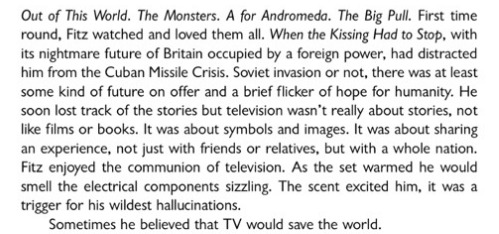
“Sometimes he believed that TV would save the world.” What a sad line, knowing the meaning of this story, huh?
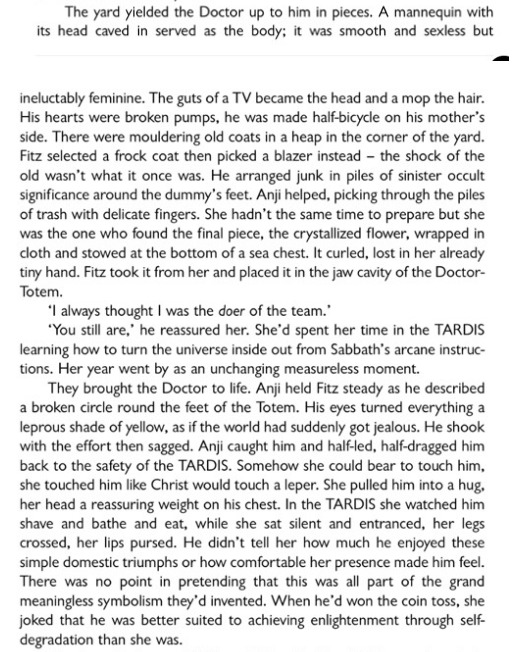
In the end of the story, Fitz and Anji rebuild their “Doctor-totem” from the junk of IM Foreman’s yard, literally using the ruins of the character’s humble 1963 beginnings to build the foundations. But remember, their Doctor is the Doctor of the novels. There’s more work to do to recreate their perception of him.
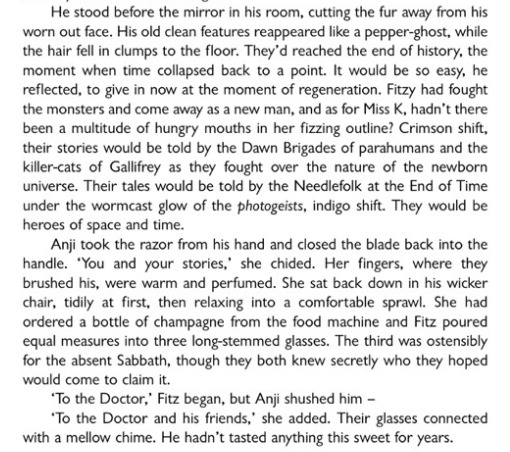
1) “Dawn Brigades of parahumans and the killer-cats of Gallifrey as they fought over the nature of the newborn universe.” Wardog’s Special Executive (representing the might and will of Rassilon) and the villains planned for the original story replaced by 1977′s The Invasion of Time (who I think here represent the Pythia), clashing during the universe’s minting (later known in Faction Paradox as the anchoring of the thread). This take on Gallifrey’s history (VNAs, EDAs, FP) is THE Gallifrey at the time of 2003.
2) “Their tales would be told by the Needlefolk at the End of Time...” The Needle, seen in The Infinity Doctors, Unnatural History, Father Time, Miranda, and alluded to or contextual related to in Hope and The Gallifrey Chronicles. An important aspect of the lore at the time!
3) This ending is so beautiful, if sad. Here is where Fitz and Anji fully represent the Doctor Who fans and creators at the time. Using their stories, their (new) adventures to further coax their Doctor back to life. He’s built from the junk and refuse of the dead Classic series, he’s lavished with the stories and lore of the Wilderness Years. He is part of humanity, he’s in us, as long as he as friends (the fans) trying to keep him alive.
#Doctor Who#Long post#Daniel O'Mahony#Eighth Doctor Adventures#Faction Paradox#Eighth Doctor#Fitz Kreiner#Anji Kapoor#Sabbath Dei#A Rag and a Bone#Myth Makers Essentials#The Adventuress of Henrietta Street#Lance Parkin#Lloyd Rose
54 notes
·
View notes
Text
In purchase to considerably much better your soccer sport, you want to maintain on finding. This limited article can assistance you with some very good methods and suggestions to boost your activity. Proceed to preserve looking by way of to discover out what you can about beginning to be a celebrity participant.
Genuinely never enable oneself hit but one more participant. Do your finest to foresee precisely where by your opponent will be in get to protect from get in touch with. That can assist you retain the ball and lessens your likelihood of obtaining injury as nicely.
Discussion is very important with the exercise of soccer. If you are about to make a selected change, it is important that the gamers on your crew know about it. If you do not want to talk about the shift out loud, show up up with a signal you can give your teammates.
When you very to start with start off enjoying soccer, make confident to get started off gradual. Plenty of folks see soccer as a really immediately-paced activity, but which is only just after you have bought practiced sufficient. You need to study good sort and movements to start out with. Executing these slowly can enable you find out how to do them thoroughly. You can pick up speed as you follow and get a good deal additional at relieve with them.
You ought to genuinely really feel peaceful about pointing out problems to the other associates of your workforce, even if you these days joined the workforce. Counsel some new strategies or draw their thing to consider to blunders you discovered. A team can commonly income from a contemporary issue of see on the methods and designs they have adopted.
Notice your dribbling by generating use of a tennis ball. This will require you to continuously be making adjustments to retain manage all over the ball. When you can conveniently obtain this, a soccer ball is sure to be that a ton a lot less sophisticated to administration.
Exercising making use of your weaker foot. This can be finished by on your own by kicking the ball in the direction of the wall or with your group. For an enjoyable exercise, have all individuals on your crew to crack up into two teams. The only rule is that all dribbling and capturing will have to be accomplished with the weaker foot. By instruction with the weaker foot, you will soon be ready to shoot as equally properly with your weaker foot as your more robust foot.
Boost your reflex time by endeavor this perform out. Stand on a solid building that is roughly a couple of toes off the ground. Leap off the product and land in a squat posture with equally of your toes planted on the floor. Straight away stand up and operate as immediate as you can.
You ought to emphasis on shifting the ball extra than your have human physique. The ball has the chance to shift a wonderful offer speedier than you do. You want to protect as a large amount electrical electrical power as you can in soccer in order to final as a outcome of the game. You require to have your vitality for bursts of velocity when essential to get down the place.
Triangulation is the ideal tactic for breaking protection of the other group. Shift the soccer ball quickly among the the your teammates to final result in your opponents confusion. Getting as a final result of all people today limited locations and defender calls for wonderful teamwork to be most effective on the soccer market. Be all set to help a teammate who is striving to induce confusion amongst the opponents.
Do all the things you can to research distinct soccer moves if you want to be a great player. Judi Bola is never ever sensible to make the specific identical moves all of the time simply since opposing teams will know what to be expecting. This signifies they will have an a large amount a lot easier time obtaining tackle of the ball.
The most significant concern to hold in intellect when taking part in soccer is to frequently just acquire the shot if you see the target. You are assured to drop limited if you you ought to not check out, so consistently give you a opportunity to make a goal by at the very minimum kicking the ball. The a lot additional photographs you pick, the greater your chance are of building it in.
Try to dribble the ball a ton less than you pass it. Passing will need to be the detail that you do the most when you are on the discipline. Passing provides your group the usually means to control the ball for lengthier and you can do it a significant amount much more immediately than you can dribble.
Convert out to be a very good soccer player by working with these tips. Soccer is an fulfilling recreation that you will like getting section in. But, you will have to have to continue to be devoted in buy to uncover out each thing attainable.
1 note
·
View note
Text
Sticks and Stones Introduces Its Stick Men NFT Series Mirroring Political and Real-Life Hypocrisies
August, 2021 ––Sticks and Stones will auction off a series of non-fungible tokens (NFT) mirroring the current political issues and real-life double standards and other contemporary issues but with a lighter tone. This is a unique artist representation made available on the block chain for interested NFT aficionados.
The NFT collection series is a series of stickmen mimicking political or real-life hypocrisies. It's a cross between serious issues vs. stick men to lighten the topic. It's rudimentary in the design, but if you closely look at it, there are deeper, fundamental human and political issues that are motivating.
NFTs or non-fungible tokens can be best understood as unique digital assets. These NFTs often exist in a wide variety of industries ranging from digital art and virtual real estate to collectible series, gaming art and a whole lot more. In this case, a stickmen series that tackles key political issues that are happening right now.
“I have suffered from depression since I was sixteen years old. I didn't understand where the sadness was coming from, so my dad encouraged me to draw. The things I would draw would be stick men that would be in pain. I used stick men because it felt like the pain in the world was less real if it was two dimensional,” shared the artist.
The Stickmen series is a preliminary collection made up of original artwork that buyers can reproduce into anything marketable whether it’s a t-shirt, art, canvas art, custom mugs or whatever they wish to use it for. Given the current political and contemporary issues we are facing right now, the artwork is highly provocative and will make you think about it under the guide of stick men/women.
“These are original edition, and I am sharing my thoughts with the world. I hope this artwork will provoke thoughts, create change, bring empathy, and help heal the pain in this world,” the artist said.
“I would draw over the years and now sharing my collection with the world. I have added digital pieces to update my current pieces and some of my older collection has been altered with digital to reflect the current times,” the artist added.
Essentially, almost all types of media can be tokenized or minted and made into an NFT from contemporary art to trading cards, popular memes, GIFS, original video clips and audio clips, tweets, and almost anything. The stickmen collection is now available in the block chain and can be bought, sold and traded using cryptocurrency.
To learn more about the stickmen collection series, you can visit Sticks and Stones at https://opensea.io/collection/2021-sticksandstones.
0 notes